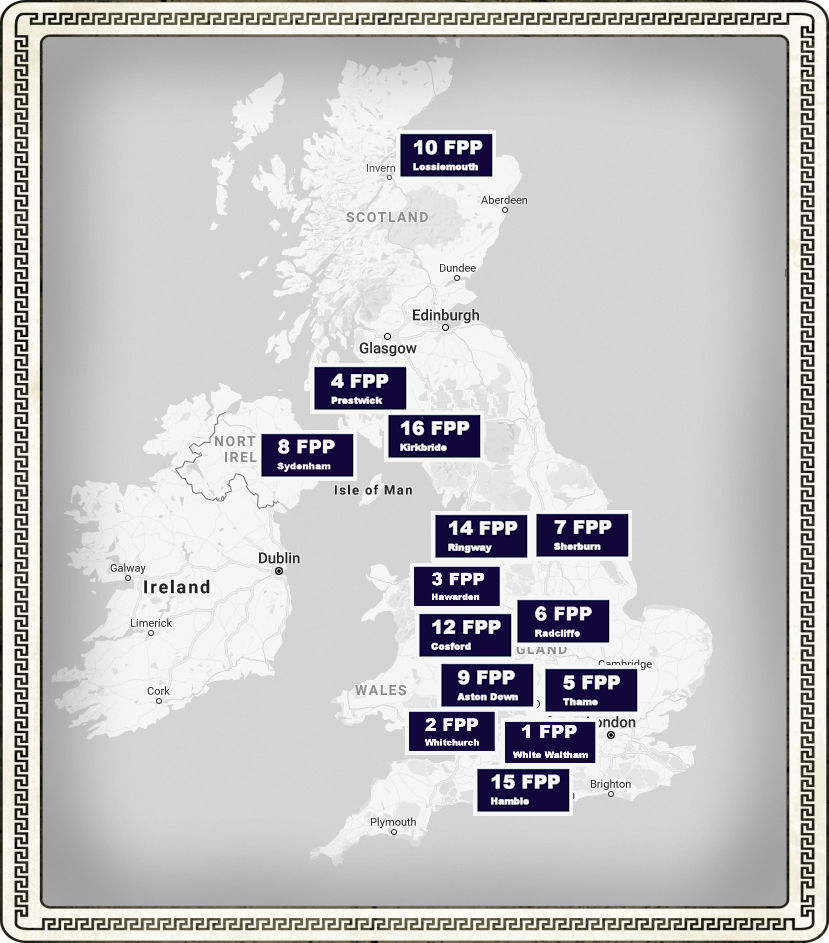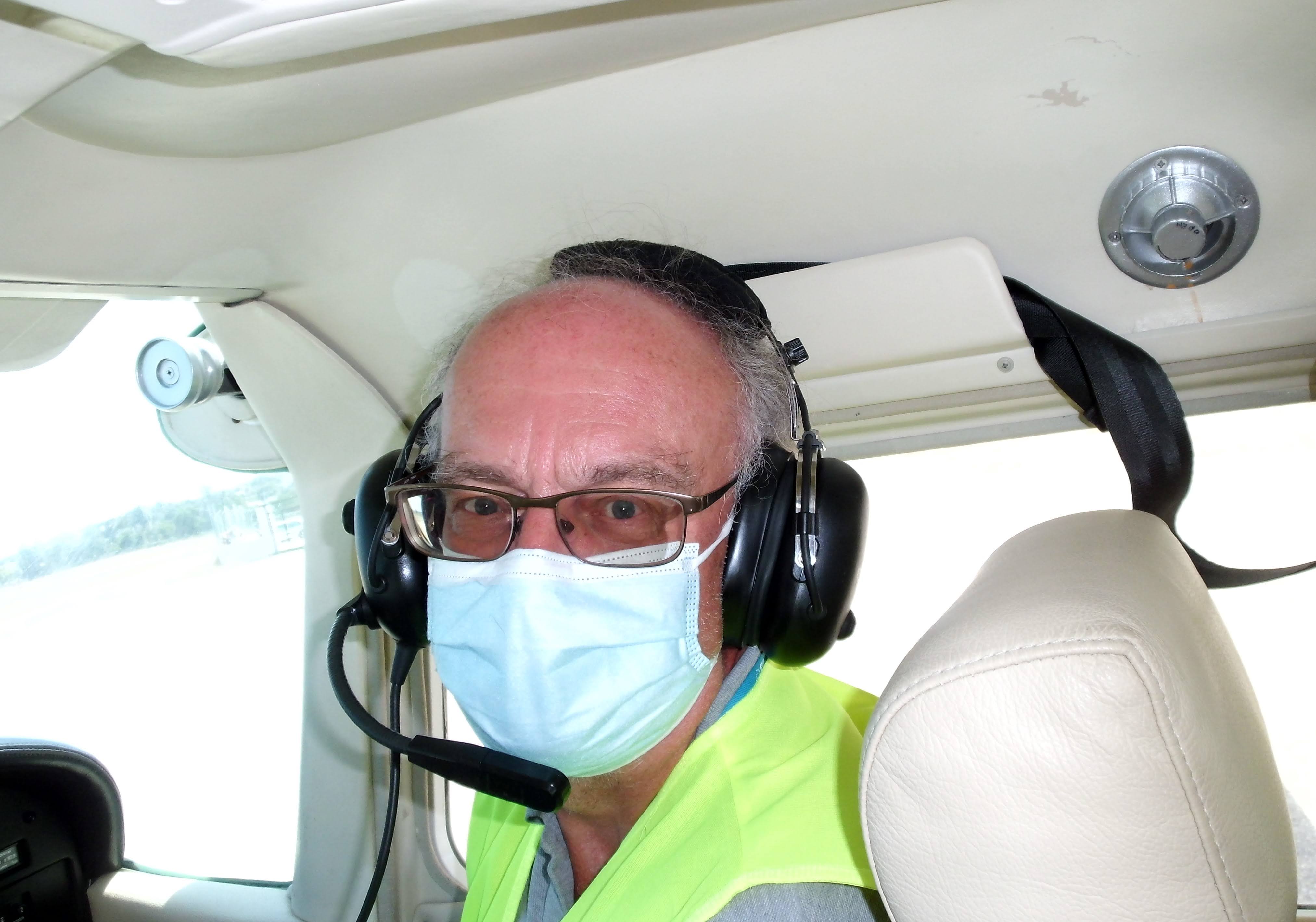- Seconded from RAF -
-
Abney, William Edward Charles Wootton
M.1014 2nd Officer
[Seconded from RAF]
William Edward Charles Wootton 'Bill' Abney 
b. 7 Jan 1921, Upminster 19 May 1944 to Apr-45
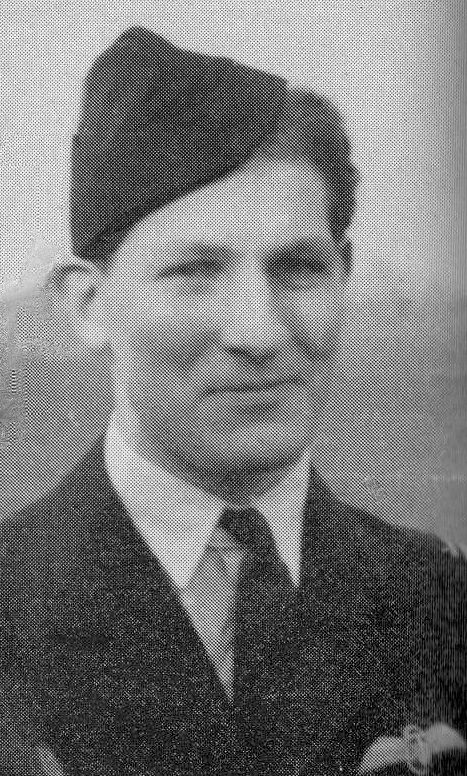 HB
HB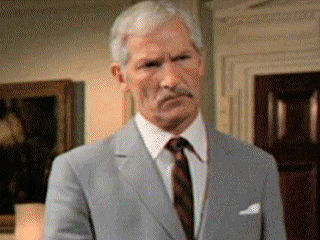 1979
1979son of Henry Charles Wotton Abney (1881-1953)
Address in 1944: West Lodge, Upminster, Essex
prev. RAF, and An Actor:
[Wikipedia: He "played Reverend Copley on Coronation Street in 1977, and Jim Lorimer in 1980. His other television credits include The Adventures of William Tell, Crossroads, Special Branch, Play for Today, All Creatures Great and Small, Robin's Nest and The Return of Sherlock Holmes.
Abney was educated at Cranleigh School and the Central School of Speech and Drama.
As a film actor, Abney appeared in Horrors of the Black Museum (1959), Never Take Sweets from a Stranger (1960), Two-Way Stretch, (1960), Cone of Silence(1960), The City of the Dead (1960), Hitler: The Last Ten Days (1973), The Legacy (1979), North Sea Hijack (1980) and Curse of the Pink Panther (1983).
As a writer, Abney wrote the story for "Poor Butterfly" (1969), an episode of Journey to the Unknown (TV series).]
Ferry Pool: 9
d. 26 Jun 1997 - Lambeth
from The Times, Tuesday, 8 July 1997: "Deaths: Abney, William, suddenly and peacefully on June 26th. Much loved friend of Barry and dear brother of Annabel and uncle of Robin Dewhurst and family. Service at Mortlake Crematorium, July 15th."
-
Aldrich, Wilfred Hector
M.1142 * 3rd Officer
[Seconded from RAF]
Wilfred Hector Aldrich 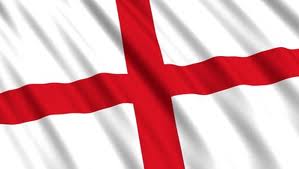
b. 1 Sep 1919 5 Sep 1944 to 30 Apr 1945
d. Sep 2000 - North Somerset
-
Ambler, John Sharp
M.846 First Officer
(Seconded from RAF)
John Sharp Ambler 
b. 24 Jun 1905, Heaton, Bradford 28 Jan 1943 to 15 Apr 1945
 1939 - Yorkshire Aero Club
1939 - Yorkshire Aero Club ATAM
ATAMFather; Sam Ambler, mother: Emily Beatrice [Sharp], of Hoyle Court, Baildon, Yorks
One sister, Ruth Beatrice (m. 1923 Emerson Lyman Fisher-Smith, m. 1935 Geoff Morris). His elder brother Lieut. Edward Sharp 'Ted' Ambler (b. 1898) 2nd Bn Scots Guards, d. 8 May 1918 in France
Ed. Shrewsbury School
A bit of a tearaway in his youth:
"SMASH - THEN FINES. Said to have been racing, John Sharp Ambler, spinner, Hoyle Court, Baildon, and Laurence B. King, of Helsley. near Chester, were each fined £5 and costs at Otley yesterday for driving motor cycles to the danger of the public.
It was stated that when near the Junction Hotel, the machine which King was riding met with an obstacle, and it shot from under him. King turned several somersaults and fell on the road. Ambler ran into the kerb about six yards beyond. " - Leeds Mercury - Saturday 22 March 1924
"BAILDON MOTOR CYCLIST'S SPEED John Sharp Ambler, worsted spinner, Hoyle Court, Baildon, was summoned for driving to the danger of the public at Baildon on November 12. It was stated by Police Constable Cooper that he was standing in a garage along Otley Road about 2.05 p.rn. when the defendant dashed past on a motor cycle combination at an exceptionally fast and dangerous speed. The constable ran out on the footpath, about seven yards from where hod been standing, and the machine then was 110 yards away.He saw the defendant later, and after some hesitation, Ambler replied that he did not pass until 2.15 p.m., and was driving very carefully.
Mr. W. T. Scholes for the defendant, submitted that the police hod made mistake in their man. The defendant went to Baildon Station to catch the 1.57 p.m. train to Bradford, but missed it. He returned home, got into his motor clothes, and rode to business. It was 12 minutes past 2 when he passed the public clock at Shipley. Defendant said he had not to be at business until 2.30, and he did not travel at more than 17 miles per hour. He mentioned that he broke the machine on the journey, and it took four days to mend it. After hearing other evidence, the magistrates found the defendant guilty. It was stated that he had been lined £5 for a similar offence at Otley in March last year. He was now fined £5 and his licence suspended for two months." - Shipley Times and Express - Friday 12 December 1924
"CROSS-ROADS CRASH. John Sharp Ambler, worsted spinner. Royal [sic] Court. Baildon was fined £10, with £4 6s. 6d. costs, at Scarborough to-day, for driving dangerously.
Mr G B Parker, prosecuting, said Ambler drove down Holbeck Road at 50 miles hour and at the cross-roads caught a mailvan driven by Herbert King, who was thrown out and injured. Ambler denied that was driving at such a speed, and said he had slowed up to 15 mph at the cross-roads." - Yorkshire Evening Post - Friday 5 May 1933
prev. a 'worsted spinner'; RAF from May 1941
prev. exp. 190 hrs on DH Moth, Oxford, Wellington
Postings: 9FPP
Two accidents, both his fault:
- 13 Jul 1943, his Henley L3399 struck a camouflaged hut when taxying - Reprimanded for "taxying without proper care"
- 16 Mar 1944, he stalled his Barracuda on approach, the port wing dropped and the port undercarriage leg collapsed
"An excellent officer and a sound type of pilot who generally has made such good progress as to warrant every confidence in him making a first rate ferry pilot"
"He is not happy in fast aircraft in bad weather and is not ashamed to admit it"
m. 1958 in Kensington, London, Mrs Gwenda Amy Allbrook [nee Oakden] (d. 2000)
Address in 1973: 4 Angel Court, Compton, Surrey;
d. 15 Jun 1974 - Compton, Surrey
-
Bishop, Frederick Arthur
M.1042 Cadet
(Seconded from RAF)
Frederick Arthur Bishop 
b. 4 December 1915, Bristol 19 Oct 1943 to Apr-45
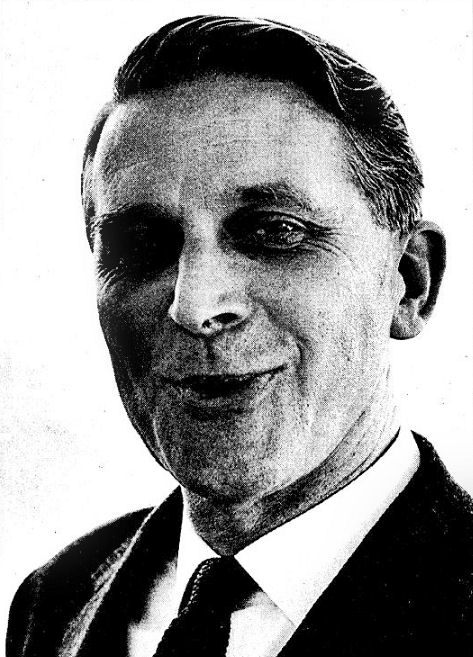
The Times
Sir Frederick Arthur Bishop, (1915–2005), civil servant and director-general of the National Trust.
Joined the Inland Revenue in 1934.
1 Jan 1940 he married Elizabeth Finlay Stevenson (1915–1999), a fellow civil servant; they had two sons and a daughter.
RAF from Feb 1942.
"An ab initio pilot who immediately made steady progress and made great efforts to fly well... he can be assessed as a natural pilot of average ability"
Oxford DNB says: "Bishop returned to the civil service in 1947, initially in the Ministry of Food. There his abilities were soon recognized; within two years he was principal private secretary to the minister, John Strachey, and to his successors Maurice Webb and Gwilym Lloyd George. He was moved to be assistant secretary to the cabinet in 1953. He was an effective manager of the cabinet's economic business, and secretary of its building committee during the government's drive to build 300,000 houses a year, led by Harold Macmillan as minister of housing. He worked closely with the powerful cabinet secretary, Sir Norman Brook, who in 1956 secured his move to 10 Downing Street to become Anthony Eden's principal private secretary. His calm efficiency won the respect, and the ear, of an increasingly embattled prime minister. Some historians believe that even under Eden his advice, and his ‘hawkish’ views on international affairs, began to acquire the influence that was to be more marked under Eden's successor Macmillan.Macmillan kept Bishop on when he took over as prime minister in 1957. Over the next four years Bishop played a key role in the policy process, exercising influence out of all proportion to his formal responsibilities. With a weak foreign secretary in Selwyn Lloyd, Macmillan relied heavily for advice on international affairs on his civil service private secretaries, whose primary loyalty was increasingly to him personally, treating them as a virtual ‘kitchen cabinet’ (Aldous, ‘Family affair’, 14), ‘more akin to American national security advisers than mere private secretaries’ (McNamara, 67). Working closely with his colleague Philip de Zulueta, Bishop did not hesitate to disagree with, and brief the prime minister against, the official Foreign Office line. He and de Zulueta have been described as the ‘“change agents” essential to any process of [policy] redefinition, [giving] access to ideas that had not been dulled by slow passage through the bureaucratic machine’ (Aldous, ‘Family affair’, 15). When in 1957 Macmillan wanted to ensure American collaboration in resisting communist infiltration into Syria, it was Bishop whom he sent to Washington for talks with the secretary of state, John Foster Dulles. Dulles was charmed and impressed by Bishop, declaring that there was ‘genuine, intimate and effective co-operation, stemming directly from Macmillan’ (McNamara, 100). Bishop often travelled with Macmillan, for instance to the Bermuda conference in March 1957 and to Moscow in 1959, the scene of a celebrated row between Macmillan and Nikita Khrushchov. His role and his influence were openly resented by the Foreign Office and the foreign secretary.
Bishop became deputy secretary to the cabinet in 1959. Although in principle he should now have been impartially serving the cabinet as a whole, he remained very close to the prime minister; he has been described as acting at this time in some respects as though he were still Macmillan's principal private secretary, advising him on European matters. During the protracted debates about Britain's relations with the European Economic Community (EEC), pro-Europeans used Bishop as their direct link to the prime minister. He was appointed CB in 1960, having been made CVO in 1957.
Bishop returned to the Ministry of Agriculture, Fisheries, and Food in 1961. Even there he continued to be influential in international affairs, especially in relation to the EEC. One historian, Jacqueline Tratt, has described him as a leading member of the small group—including Harold Macmillan, Edward Heath, and Sir Frank Lee, permanent secretary to the Treasury—that connived to bring about a major change of policy orientation, almost surreptitiously planning and putting into action the ultimately unsuccessful first approach to the EEC in 1961. He also played a significant part in creating the National Economic Development Council. He intended this in part to rival a department he disliked, the Treasury, arguing that there was a need for ‘a more planned approach to the national economic problem … a partnership with employers and unions’ (Ringe and Rollings, 342–3). His draft terms of reference were reproduced largely verbatim when the creation of the council was announced by the chancellor of the exchequer, Selwyn Lloyd.
After three years in the Ministry of Agriculture, Fisheries, and Food Bishop's government career seemed to be moving towards a climax when, in 1964, he was appointed permanent secretary of the Ministry of Land and Natural Resources, newly created by Harold Wilson. Wilson's aim was to speed up the planning process by removing it from what some saw as the dead hand of the Ministry of Housing and Local Government. Others felt that the new department, with a remit to bring forward more land for development by taxing landowners and developers, never had a chance. It was doubly unfortunate for Bishop both that his new minister, Fred Willey, was out of his depth and that the Ministry of Housing and Local Government was led by one of the most formidable civil servants of the post-war period, Dame Evelyn Sharp. She was determined that her department should lose no important responsibilities. Exploiting the access of her own minister, Richard Crossman, to Wilson, she fought ruthlessly to ensure, first, that the new ministry was given no real powers and, second, that it was wound up as soon as possible. Willey's complaints and Wilson's resentment were unavailing. Bishop, who had no illusions about either his ministry or his minister, found himself in a non-job. By June 1965 he had let it be known that he wished to resign from the civil service and Crossman was exulting in his diary, ‘He should be sent off as soon as possible. Let's get rid of him this summer’ (Crossman, 261).
Bishop was an able and well-liked public servant who, in his most senior Whitehall post, was unlucky to be frustrated by such fierce bureaucratic and political in-fighting. He left the civil service in 1965 and took a number of part-time posts, most notably on the board of S. Pearson & Son. In 1968–9 he was a member of a group of former senior officials set up to advise Edward Heath, then leader of the opposition, on reforms to the machinery of government. The Pearson board brought him into regular contact with Patrick Gibson, a committee member (and later chairman) of the National Trust. One result was that in January 1971 Bishop took up his final full-time position, as director-general of the National Trust. He succeeded another former senior official, Sir John Winnifrith, whose name he had suggested himself.
The National Trust, whose ethos Bishop was to describe as ‘amateurism, in the real and best sense of the word’ (Jenkins and James, 258), was trying to bring its style more into line with modern needs; it had opened its first shop in 1970, and during Bishop's tenure enlarged its professional staff and saw its membership double (to 500,000). Described by a former colleague as ‘by nature a manipulator and negotiator’ (Gaze, 235), Bishop used his Whitehall experience and contacts assiduously on behalf of the trust, in particular helping to secure valuable changes in the rules governing the tax treatment of bequests and gifts. Not all was smooth sailing, however: the 1975 annual report noted that ‘a high level of inflation will make it impossible to maintain the high standard of conservation which both members and the general public have come to expect’. When Bishop that year outlined to staff the executive committee's proposals for a 20 per cent cut in real expenditure, the need for this was hotly questioned and tempers ran high. But in general Bishop was popular, both with members of the trust's committee and with staff, for whom he obtained better salary levels and pension arrangements. His management style was described as ‘unobtrusive’, without undue intervention in matters of detail (Gaze, 244).
Bishop (Fred to his family, but Freddie more widely) took early retirement for health reasons from the National Trust in May 1975, having been knighted in January that year, and he and his wife moved to Cornwall. He had already been a member of the BBC's general advisory council (1971–75), a director of Pearson Longman (1970–77), and chairman of the Home Grown Timber Advisory Committee (1966–73); in Cornwall he took up directorships with English China Clays Ltd (1975–86) and Lloyd's Bank (1976–86). He continued to practise his skills as an amateur painter and his gift for friendship, not only with the Gibsons and others but also with Harold Macmillan, who visited the Bishops several times and remained in close touch until his own death. In 1987 Bishop and his wife moved to Hampshire to be closer to their grandchildren. He died at his home, Manor Barn, 65 Church Road, Bramshott, Hampshire, on 2 March 2005, of an acute transformation of chronic lymphatic leukaemia. He was survived by his three children, his wife having predeceased him."
-
Blake, Thomas Howes
M.828 First Officer
[Seconded from RAF]
Thomas Howes Blake 
b. 16 Apr 1913, Isle of Wight 6 Jan 1943 to 15 April 1945
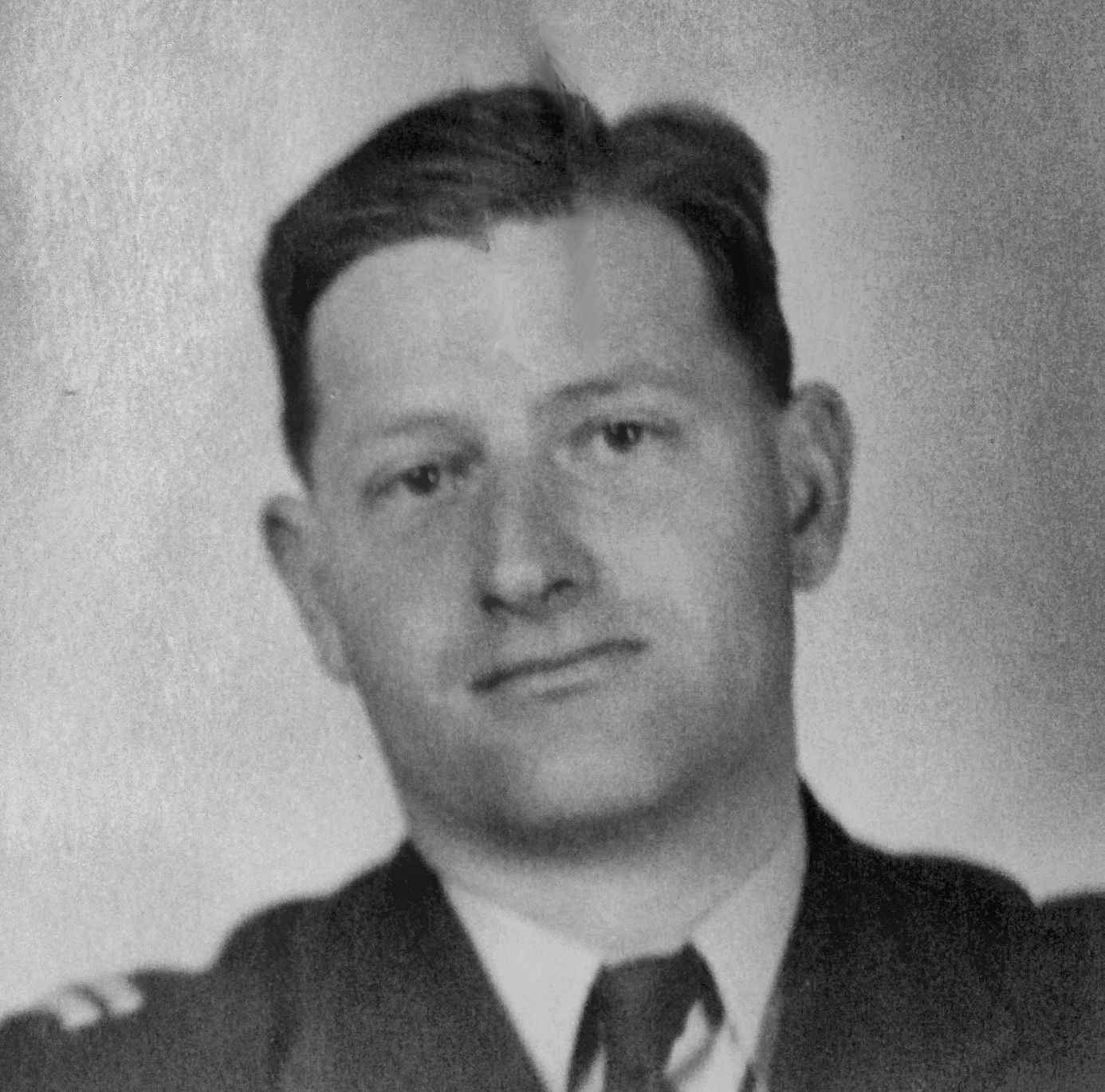 RAFM
RAFM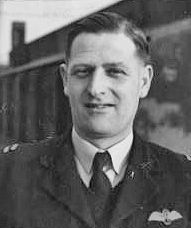 MAMM
MAMMAddress in 1943: Apes Down, Calbourne Rd, Newport, Isle of Wight
prev. Legal Assistant, IoW Council; RAF 3 Apr 1941 - Dec 1942
Postings: 5FPP, 2FPP
d. Apr 1996 - Isle of Wight
-
Boilstone, John William
M.849 Flt-Sgt / First Officer
[Seconded from RAF]
John William 'Jack' Boilstone 
b. 28 Jun 1915, Stourbridge, Worcs 30 Jan 1943 to 9 Dec 1943
 ATA
ATAFather: Joseph Pearson Boilstone, a Farmer; mother: Dorothy May [Downing]
m. 1942 in Bromsgrove, Dorothy Margaret [Taylor, b. 1919]
prev. a Motor Tester; RAF from 5 Jul 1941, 10 OTU, Abingdon
prev. exp. 190 hrs on Stearman PT 17, Harvard, Vultee, Oxford, Whitley in UK and USA
Address in 1943: Hillingdon, Highfield Crescent, Blackheath, Birmingham
Postings: 16FPP
"A neat and steady pilot of good average ability who takes his work seriously and has the makings of a very good ferry pilot"
"He posseses a quick & keen personailty and his discipline has been exemplary"
One accident, his fault:
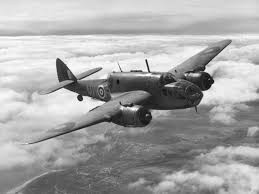
d. 9 Dec 1943 in Beaufort II LZ146 which stalled on approach to Kirkbride, dived into the ground 1000ft west of the airfield and was destroyed. Ferry from 44 MU Edzell to 40 APU Melton Mowbray.
Buried St Kenelm's Churchyard, Romsley, Worcs
 "Constantly remembered by his wife, parents and all relatives"
"Constantly remembered by his wife, parents and all relatives"
FLT SGT J.W. BOILSTONE
FIRST OFFICER A.T.A.
LOVING MEMORIES ALWAYS
OF MY DARLING HUSBAND
JACK.
WHO LOST HIS LIFE WHILE
ON DUTY AS A FERRY PILOT
DEC 9TH, 1943
AGED 28 YEARS.
OUR GARDEN OF MEMORIES
LIVES ON
Dorothy later (1951) m. Alfred J Newman and d. 2008
-
Brasher, Ronald David Henry
M.1105 3rd Officer
(Seconded from RAF)
Ronald David Henry Brasher 
b. 3 Oct 1922, Yorkshire 20 Jun 1944 to Apr-45
prev. RAF, and an Engineer's clerk
d. 1986, Derbyshire
-
Bromley, Thomas
M.892 2nd Officer (Seconded from RAF) Thomas Bromley 
b. 10 Oct 1922, Wigan 18 Mar 1943 to Apr-45
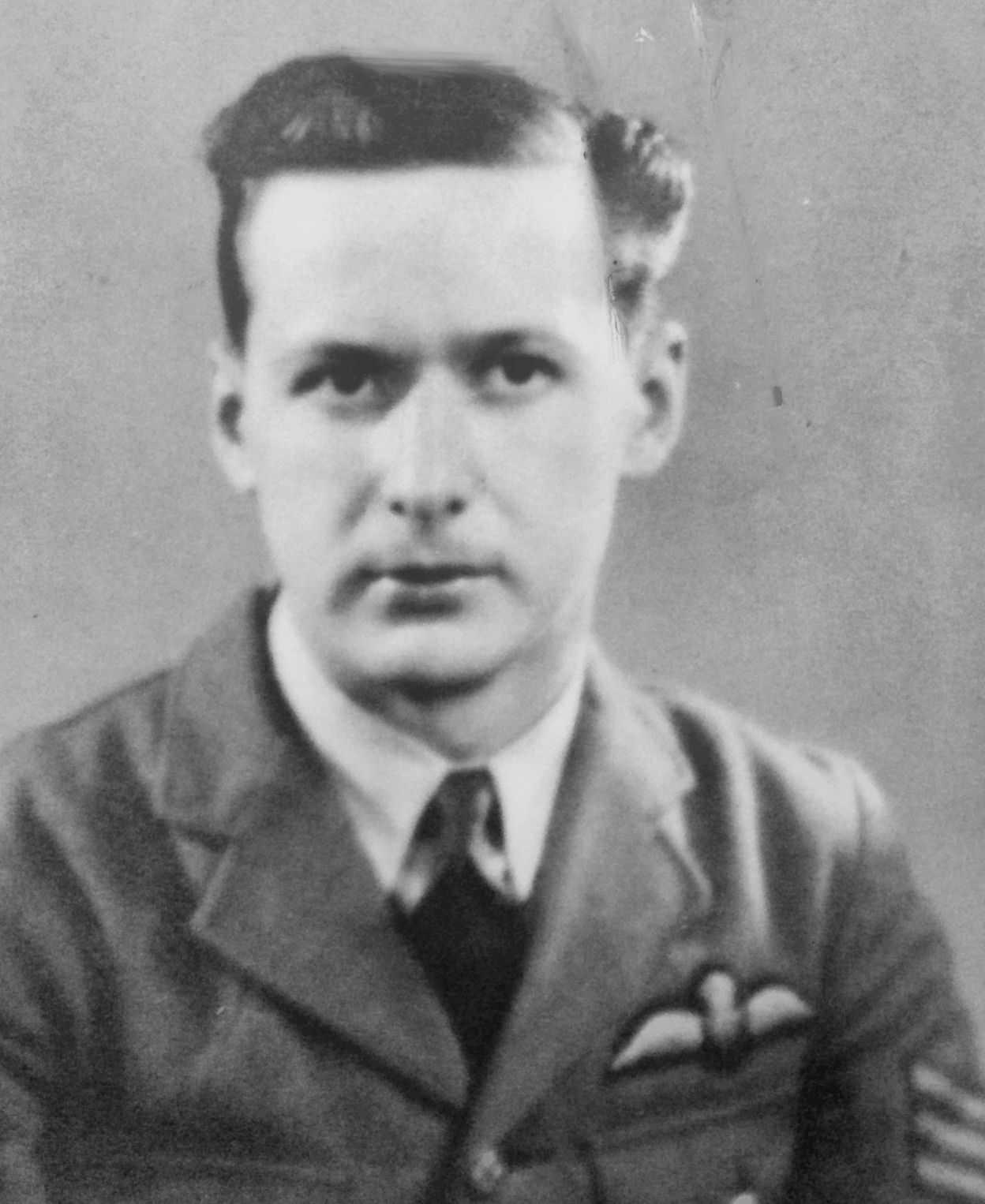 ATA
ATAprev. RAF, from Feb-1942, and an Analytical Chemist
-
Brown, George Gilbert
M.1117 3rd Officer
(Seconded from RAF)
George Gilbert Brown 
b. 9 Feb 1922, Finedon, Wellingborough, Northants 20 Jun 1944 to Apr-45
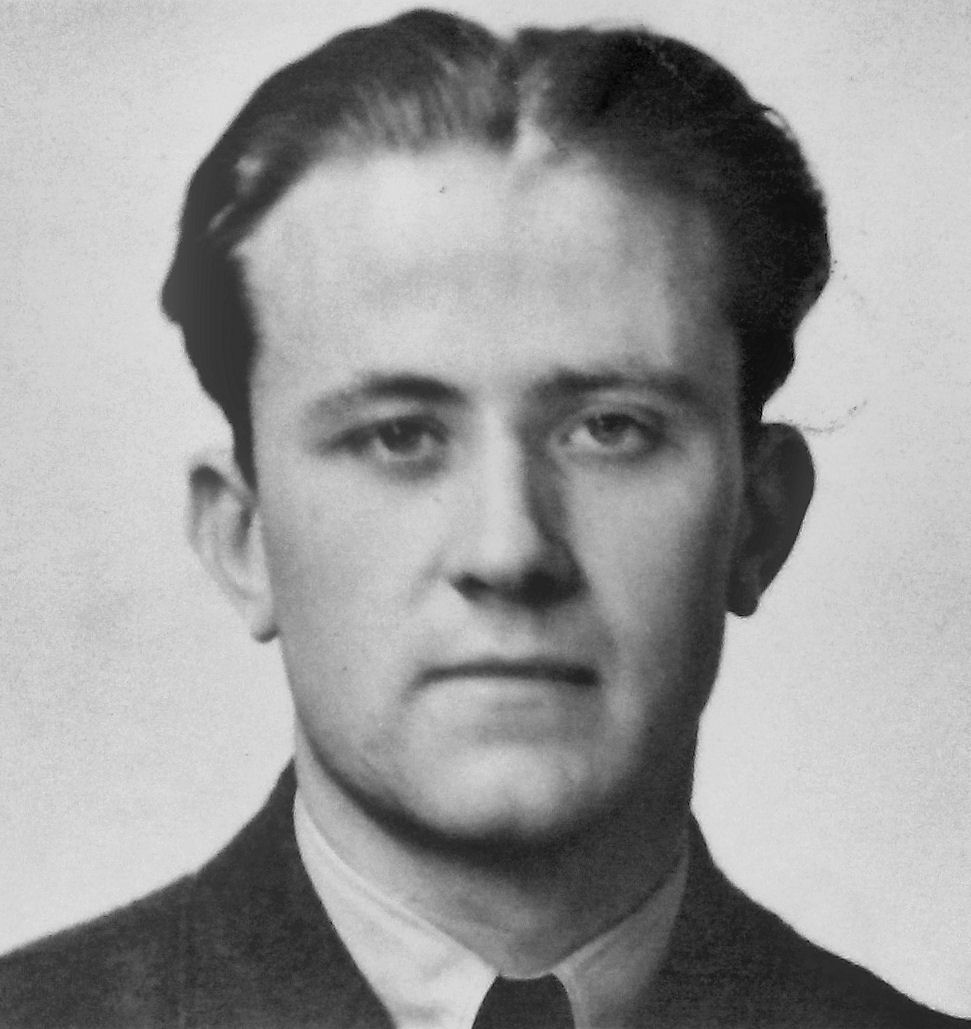 ATA
ATAprev. RAF, and an electric loco driver
d. Feb 2004, Coventry
-
Brown, James Waldron
M.1057 3rd Officer
(Seconded from RAF)
James Waldron Brown 
b. 6 Aug 1918, Liverpool 23 May 1944 to Mar-45
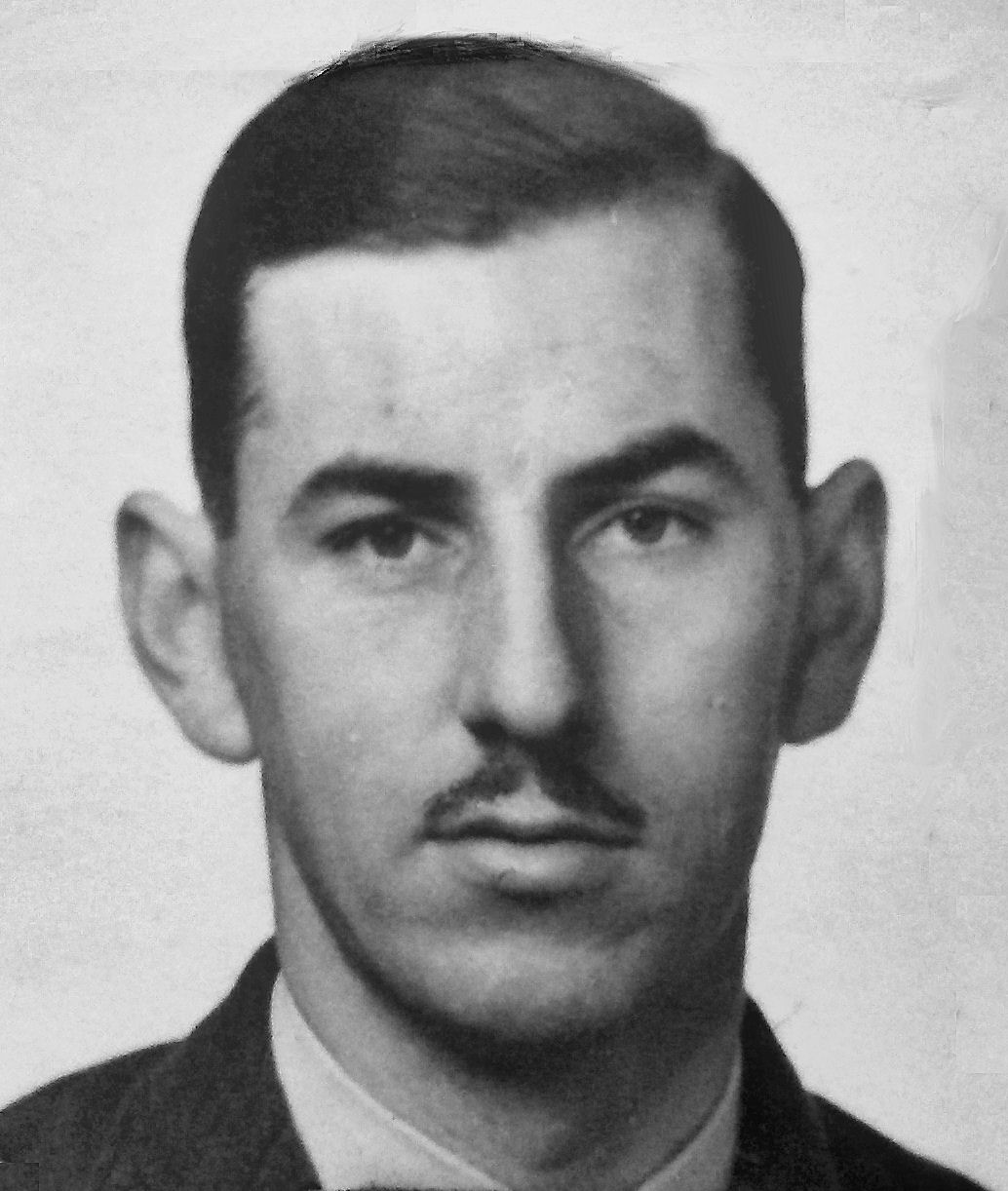 ATA
ATAprev. a draughtsman
RAF from May-41 to May-44

d. 20 Mar 1945 (Died in ATA Service) - passenger in Anson I DJ471 (pilot Frank Hill, also killed) which collided with a Typhoon at RAF Aston Down, Glos.
Both aircraft were approaching to land, but neither pilot could see the other; the Typhoon struck the Anson from behind and above.
-
Brown, Kenneth William
M.876 First Officer [Seconded from RAF] Kenneth William Brown 
b. 2 Jul 1920, Bulwell, Nottingham 28 Feb 1943 to Apr-45
prev. a teacher
-
Brunskill, Eric
M.806 First Officer (RAF Sgt)
[Seconded from RAF]
Eric Brunskill 
b. 10 Sep 1914, Spennymoor, Co. Durham 19 Nov 1942 to 23 Jan 1944
In 1939, he worked for Warwickshire County Council on (honestly) "Egg Laying Trials"
prev. RAF from 3 Mar 1941
prev. exp. "some experience on fighter types, including Spitfires", in UK, Miami and Oklahoma, USA
Postings: 3FPP
3FPP from 24 Jul 1943
"gave the impression of being casual and rather uninterested.. this may be only his manner but he should realise it is apt to give the wrong impression to others"
"An average pilot who has tried hard and made normal progress"
One accident, not his fault:
- 23 Jan 1944, the accident in which John Hawkey was fatally injured and Pilot Officer Edward Vincent suffered severe burns; his Beaufighter was hit by a Mustang landing on the wrong runway at Hawarden.
Eric was admitted to Derby Royal Infirmary and then RAF Hospital Cosford with burns to his face and hands, transferred to the Queen Victoria Hospital in East Grinstead on 19 Oct 1944 and became a member of 'The Guinea Pig Club' - one of 649 Allied Aircrew treated there for burns injuries.

https://www.eastgrinsteadmuseum.org.uk/
m. 1946 in Cambridge, Muriel Maud Allgood; one son Rupert b. 1947
d. 24 Nov 1983 - Derby
-
Butterworth, Dennis Mills
M.1061 3rd Officer
[Seconded from RAF]
Dennis Mills Butterworth 
b. 24 Apr 1921, Manchester 27 Apr 1944 to Apr-45
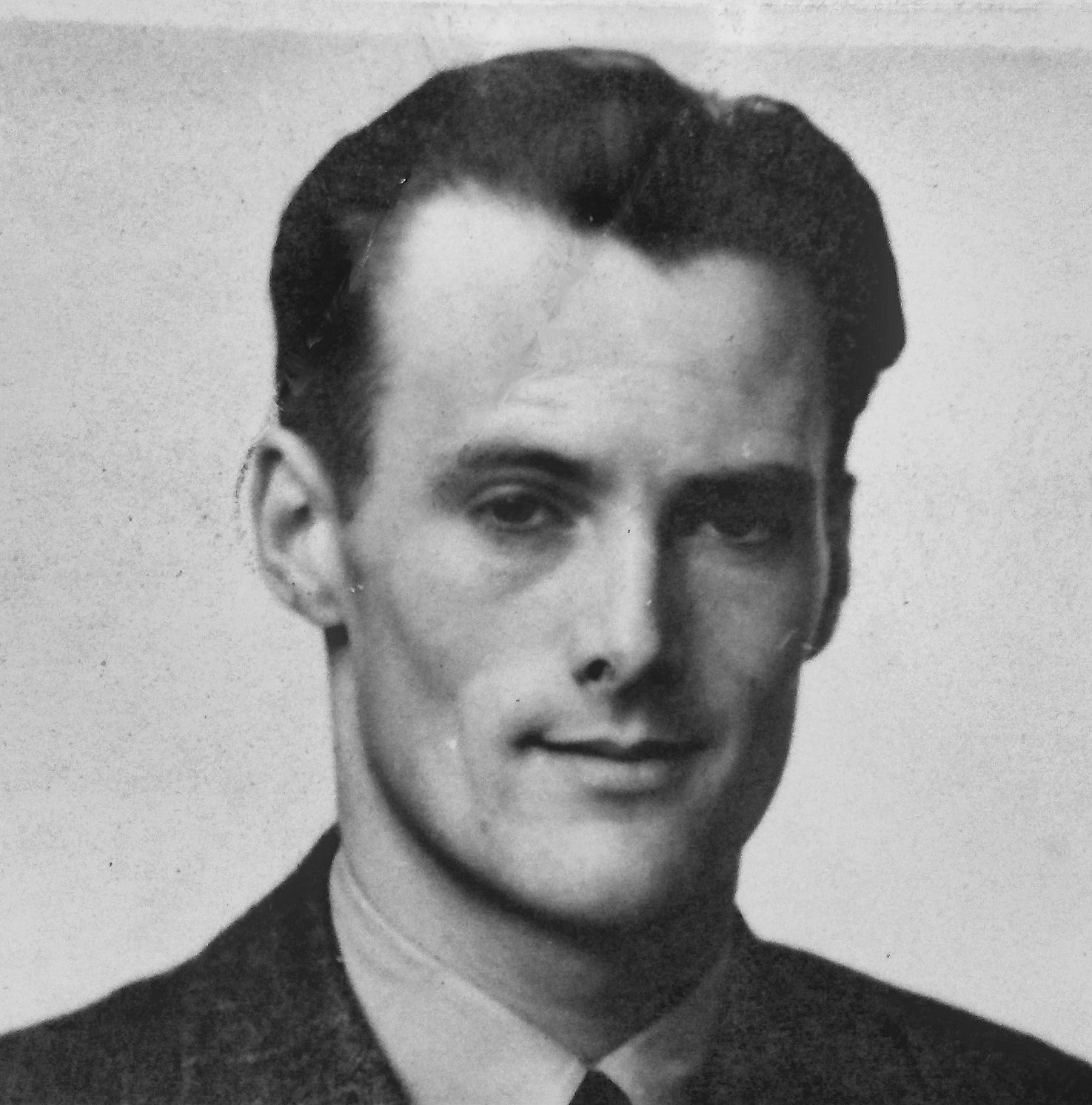 ATA
ATAprev. a Commercial Artist
RAF May-40 - 1944
-
Campbell, Albert Bower
M.1085 3rd Officer
[Seconded from RAF]
Albert Bower Campbell 
b. 11 Jan 1913, Alderley Edge 10 Jun 1944 to Apr-45
prev. RAF A/C inspector
-
Carter, Charles Leo
M.842 First Officer
[Seconded from RAF]
Charles Leo Carter 
b. 19 Jan 1915, Manchester 29 Jan 1943 to Apr-45
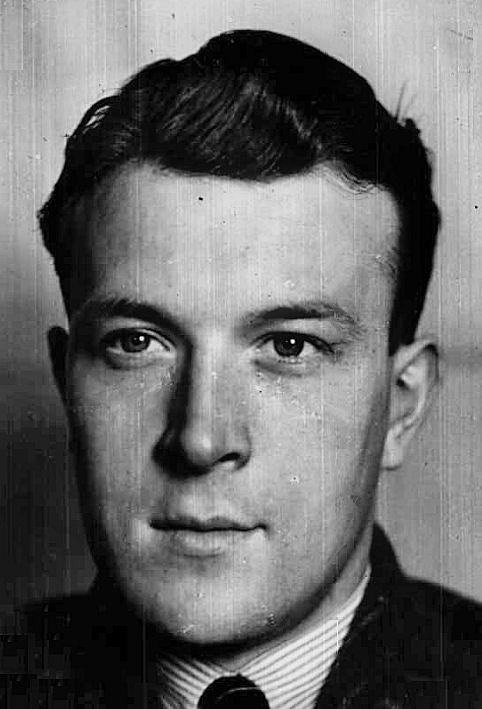 1939
1939 ATAM
ATAMprev. Newspaper photographer, then RAF from 1939
-
Carter, Raymond Harry
M.1054 First Officer
[Seconded from RAF]
Raymond Harry Carter 
b. 19 Feb 1921, Rugby 23 May 1944 to Apr-45
prev. a Travelling Salesman, then RAF 41-44 (Africa Star and Clasp)
-
Chapman, Laurence Alfred
M.867 First Officer
(Seconded from RAF)
Laurence Alfred Chapman 
b. 13 Sep 1921, Upminster 19 May 1944 to Apr 1945
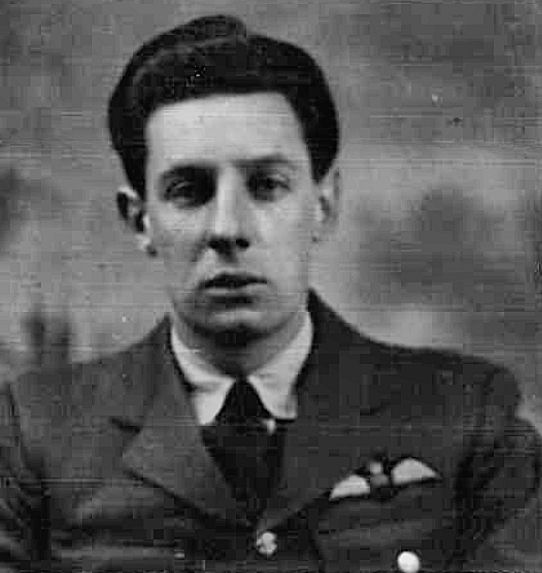 1946
1946 ATAM
ATAM
-
Chifney, Ronald Walter Francis
M.991 3rd Officer
(Seconded from RAF)
Ronald Walter Francis Chifney 
b. 6 Oct 1918, London 19 May 1944 to Apr-45
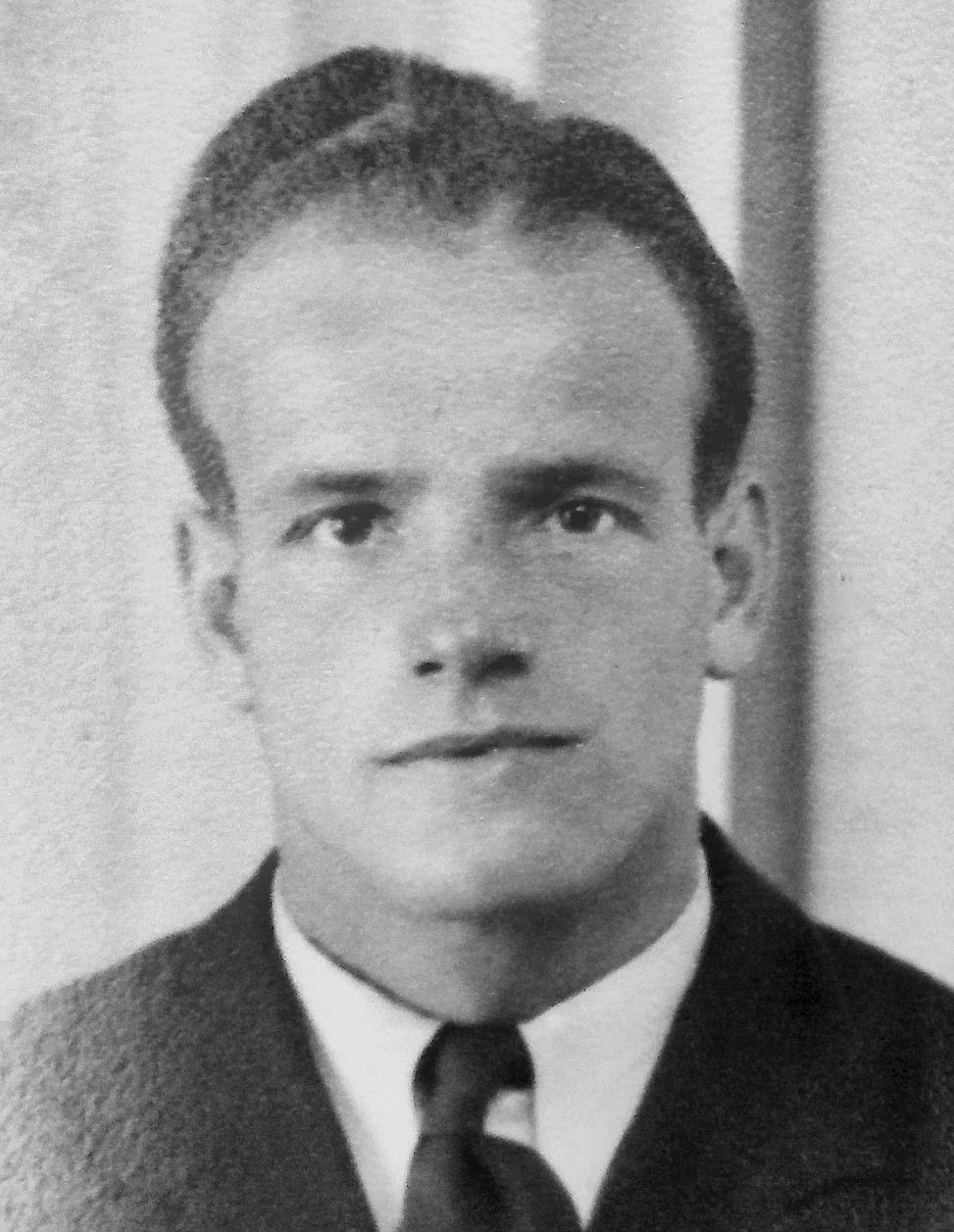
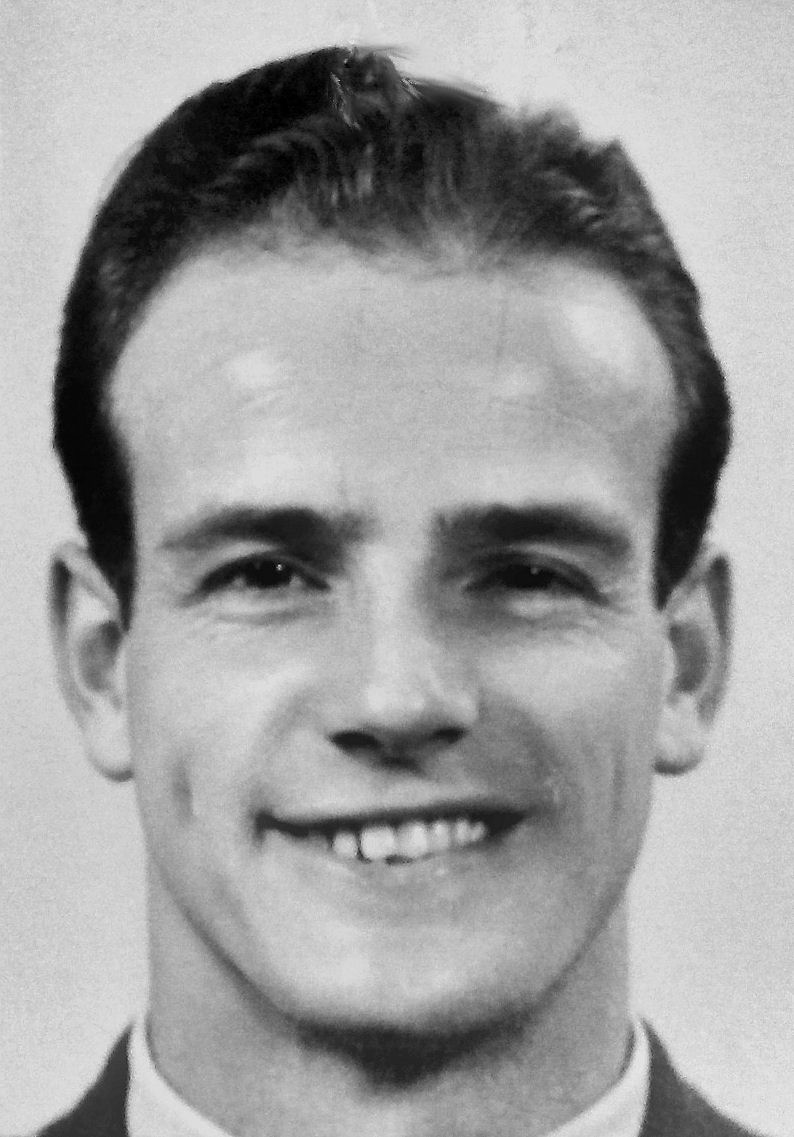 ATA
ATA
-
Christie, Frederick William
M.--- 3rd Officer
(Seconded from RAF)
Frederick William Christie 
b. 5 Dec 1917, Aberdeen 13 Jul 1944 to Oct-45
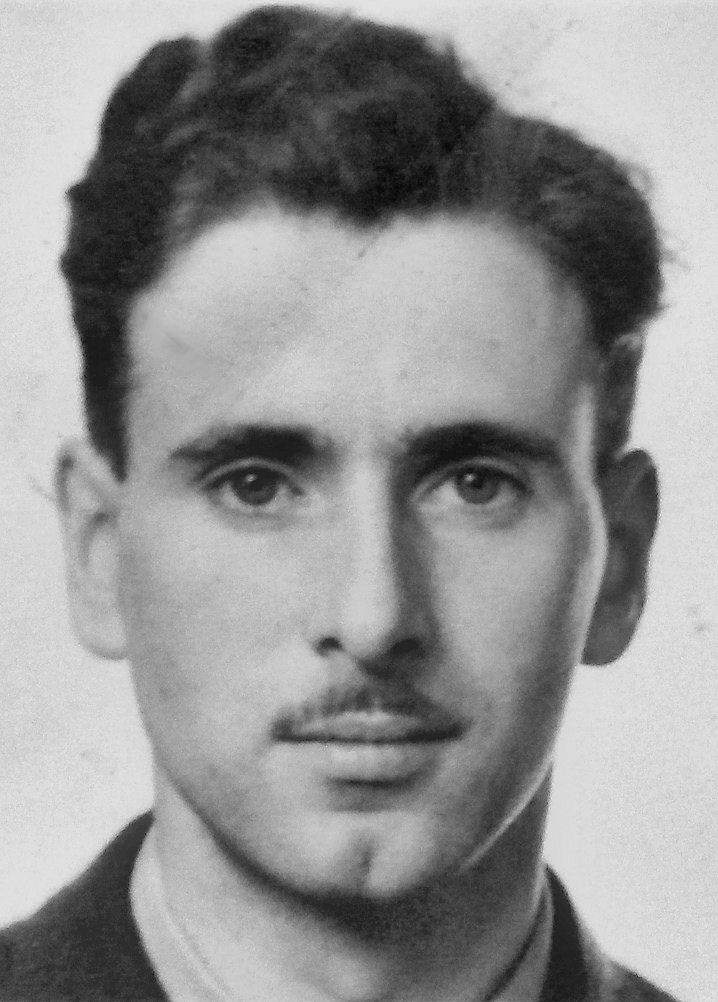 ATA
ATAThe ATA Benevolent Fund reported in 1958: "On 6 Sep 1944 while flying a Miles Magister he crashed at Toddington, Herts. He was based at Thame at that time, and had taken off on a test flight from Barton. He was admitted to Luton and Dunstable Hospital, suffering from concussion, fracture of the spine, fractures of both femurs, fracture of ankle, and shock. He has a complete loss of memory concerning the accident and has never recovered his memory about the events before or after the accident.
He was in L&D for about 6 months and the under treatment for several months as an out-patient at Aberdeen Royal Infirmary. This was followed by a period in the RAF Hospital, Halton, and at Loughborough Rehabilitation Unit, finally returning to Halton. Altogether his treatment occupied nearly three years."
"Since his return to work his health has been poor - he suffers from stomach trouble, and also has nervous symptoms and sleeplessness. Also he told me he worries about trifles which a normal person would not consider.
He struck me as a very genuine person and not someone who was cadging."
The Fund agreed that a sum of between £50 and £60 should be awarded "towards the cost of a holiday for Mr and Mrs Christie and the two dependent children."
-
Cochrane, John Noble
M.986 3rd Officer [Seconded from RAF]
John Noble Cochrane 
b. 31 Jan 1923, Newcastle on Tyne 5 Oct 1943 to 15 Apr 1945
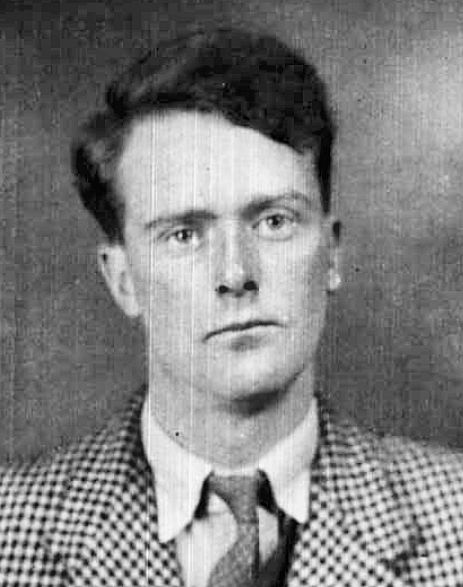 1947
1947 ATAM
ATAM ATAM
ATAMFather: Wilfred Theodore Claude Cochrane, Mother: Yseult Joan
Ed. Eton, Magdalene College Cambridge
prev. RAF Sep-42 to Oct-43
Address in 1943: Edenmore, Stranolar, Co. Donegal, Eire
Postings: 8FPP
2 accidents, 1 his fault:
- 1 Nov 1944, he landed his Spitfire VII with the tail wheel retracted, due to a technical fault [The Mk VII was the first Spitfire with a retractable tail wheel, btw] [The accident happened at Aldergrove, so I think this must be him, although the pilot is recorded as 'T.M Cochrane'];
- 2 Mar 1945, he seriously injured a pedestrian, naval rating A M Ducker, while taxying in a Swordfish. His attention was distracted by a motorcyclist coming towards him.
Address in 1947: 15 Alpha Rd, Cambridge
m. 1952 Georgiana Elizabeth Fane de Salis [4 childen]
He was a Development Engineer with Bristol Aeroplane Co. between 1947 and 1961, and was in the Scientific Civil Service at RAF Farnborough.
-
Cooper, Geoffrey James
M.1073 3rd Officer
[Seconded from RAF]
Geoffrey James Cooper 
b. 8 Dec 1917, Worcester 10 May 1944 to Apr-45

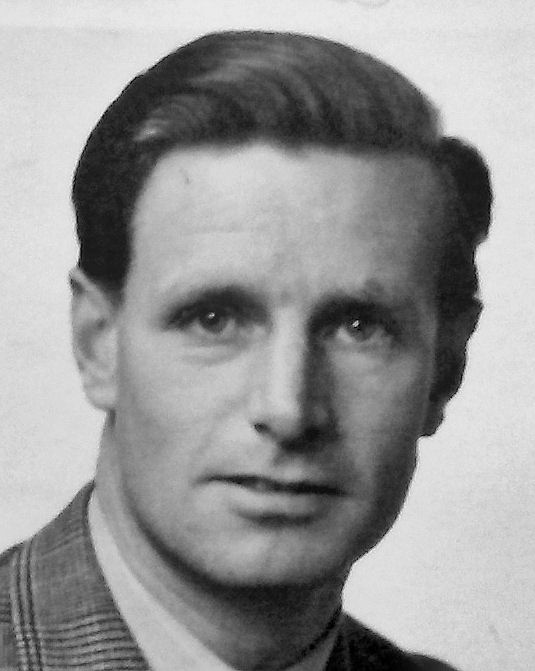 ATA
ATA
prev. Advertising, and RAF for 4 years
-
Couser, Archibald Campbell
M.967 3rd Officer
[Seconded from RAF]
Archibald Campbell Couser 
b. 5 Jan 1920, Falkirk 7 Sep 1943 to 17 Aug 1944
 ATA
ATA Falkirk Herald
Falkirk HeraldFather: Archibald Couser
prev. Post Office Telephone Engineer; RAF (LAC)
Address in 1944: 75 High Pleasance, Falkirk, Stirlingshire
Postings: 5TFPP
One accident, not his fault
- 9 Feb 1944, his Magister was in a "slight collision in mid-air" with another Magister, denting the ends of his propeller.
"A very keen and alert type who has, on the whole, shown average progress and ability although he is a little inclined to rush himself at times in his enthusiasm."
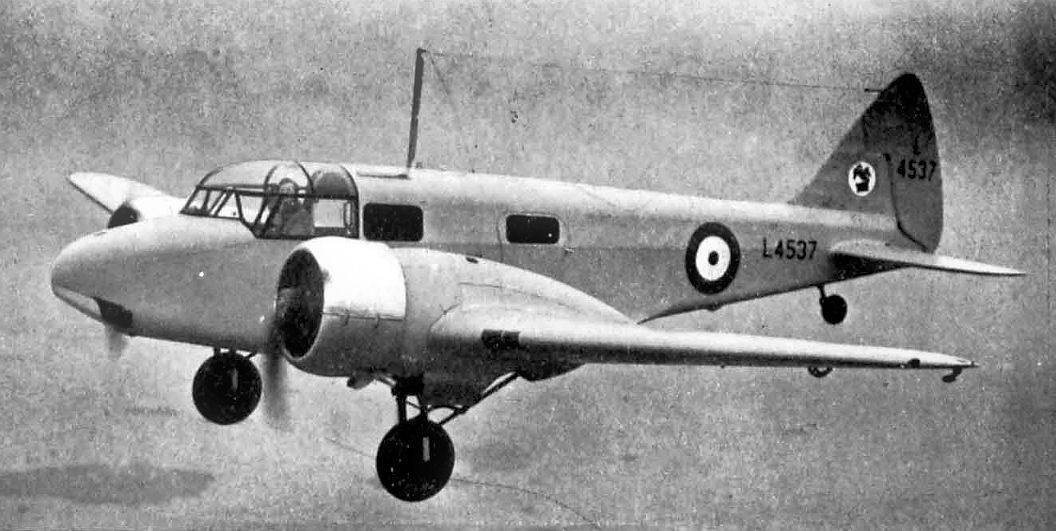
d. 17 Aug 1944 (age 24) as a passenger in Oxford PH235, piloted by First Officer Thomas Frank Thompson (M.841).
Ferrying from Airspeed's factory in Portsmouth to 44 MU Edzell, Angus, Scotland; for an unknown reason (possibly hitting HT cables), the aircraft dived into the ground at about 17:30 near Holmes Chapel, Cheshire.
The other passenger, Third Officer John Douglas Dale (M.968) was also killed.
Buried 22 Aug 1944 in Camelon Cemetery, Falkirk: Sec 12 Grave 662.


"Killed on Active Service in Cheshire, Eng."
Dearly Beloved Son of
ARCHIBALD & LILY COUSER
The Above
ARCHIBALD COUSER,
Died 28th Oct. 1947,
Aged 58 Years.
Also the above
LILY COUSER
Died 5th Jan. 1980
Aged 85 Years
"Mr and Mrs Archibald Couser, 75 High Pleasance, Falkirk, received official intimation last week that their only son, Third Officer Archibald Campbell Couser, Air Transport Auxiliary, had been killed on active service.
Third Officer Couser, who was 24 years of age, a native of Falkirk and a former pupil of Falkirk High School. On leaving school, he obtained employment in the telephone engineering department of Falkirk Post Office, and continued in that until he proceeded to service with the Royal Air Force in May of last year. In September last he was transferred to the Air Transport Auxiliary. Since his lamented death, his parents have received many letters offering condolences in their bereavement, including one from Sir Stafford Cripps, Minister of Aircraft Production, who wrote: “His work for the Air Transport Auxiliary was, as you know, extremely important to our war effort, and we can ill afford to lose such a valuable pilot and officer as your son had proved himself to be. His loss will be greatly felt by all his colleagues."
Mr A. H. Brown, telephone manager of the South- West Telephone Area, also wrote expressing regret, adding that Third Officer Couser had held the respect and esteem ‘of all his colleagues in the department and that he was of an extremely zealous and industrious nature, and would undoubtedly have had a successful career in the Post Office. Sympathy from the High School was expressed in a letter from the rector, Mr A. C. Mackenzie. In civil life, Third Officer Couser’s chief interest outside of his work was music. He was an accomplished pianist, and was associated as such for some time with the Imperial Dance Band. He was also fond of swimming and skating." - Falkirk Herald - Saturday 26 August 1944
-
Coutanceau, Maurice Gaston Emile
M.---- Pilot Officer
(Seconded from RAF)
Maurice Gaston Emile Coutanceau  +
+
b. 23 Feb 1920, Montpellier, France 20 Nov 1942 to 26 Oct 1943

3 Mar 1942

as an RAF pilot 1941-2

Flying an Airspeed Oxford, 1941-2
Father: Dr. Jean Leon Maurice Coutanceau, a GP and regional Medical Officer for the Railway Company PLM (Paris-Lyons-Mediterranée); Mother: Madeleine Jeanne [Goiran], of 236 Royal Road, Rose Hill, Mauritius
His younger brother, Henri Coutanceau, also joined the ATA, but did not progress beyond 'Cadet'.
Ed. Royal College of Mauritius, Curepipe; Loughborough College, Shrewsbury(?)
"He ended his studies in 1938, having been partly handicapped by asthma." - Henri Coutanceau
m. Aug 1942 at St Laurence Church, Upminstrer, Essex, Pauline Doris [Weston]
prev. exp. 115 hrs on Tiger Moth, Oxford, Whitley
Sailed to the UK after the fall of France in 1940
Flt-Sgt, RAF from 23 Jan 1941 to 19 Nov 1942 (Pilot Officer from 1 Sep 1943)
Address in 1943: 19 Claremont Gardens, Upminster, Essex
Postings: 3FPP
This photo was taken by his brother Henri, only a few weeks before Maurice's death:
 Ferrying a Wellington from Broughton to Dumfries, Sep 1943
Ferrying a Wellington from Broughton to Dumfries, Sep 1943
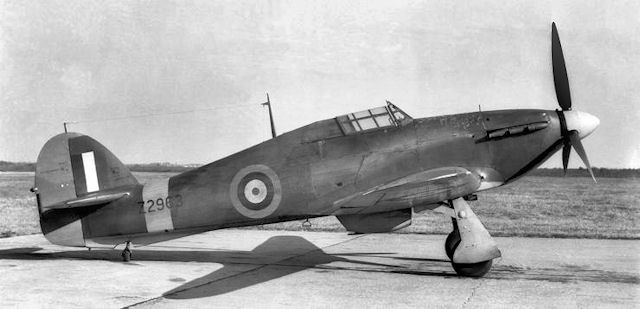
d. 26 Oct 1943 (Died in ATA Service) - Hurricane IIc LE262 struck hillside at Flatfell, Kinniside Cleator, Cumberland, 10 miles E of St Bees Head, in bad weather
buried St Laurence Church, Upminster, Essex



This commemorative plaque was placed in the church on 7 Apr and
dedicated at the parish mass on 14 May 2000"
- Henri Coutanceau and Alfred Ellis
"Writtle Land worker bereaved.
Mrs Pauline Coutanceau, of Claremont Gardens, Upminster, of the Essex Women's Land Army, has received notification that her husband, Pilot-Officer Maurice Coutanceau. has been killed on active service. Pilot-Officer Coutanceau came from Mauritius early in the war to join the R.A.F and met Miss Pauline Weston, who was then in the W.L.A. at Writtle. They were married in August, 1942. The young wife continued in the W.L.A., in which she enrolled at the age of 17 in 1940. In training at the Writtle Institute she specialised in horticulture, and is employed by Mr. Lawrence Taylor, of Galleywood." - Chelmsford Chronicle - 19 Nov 1943
"Maurice had been interested in both aviation and photography since he was a small boy. Not long before he left Mauritius to join the RAF, on the 5th and the 22nd November in 1940 he had given two talks on the local Radio Station in Mauritius, one entitled 'Photography Through the Ages', and the other on
aviation entitled 'Commercial and Test Flights'.There is also a plaque with Maurice's name on it in the French Protestant Church in Soho Square, London, commemorating the French Protestant (Huguenot)
Servicemen who died in action during the Second World War." - Henri CoutanceauPauline re-married in 1951
** with huge thanks to Maurice's niece Suzanne, who kindly shared many documents and photos of her father Henri, and her uncle Maurice.
-
Craven, George
M.1111 3rd Officer
[Seconded from RAF]
George Craven 
b. 4 Mar 1914, Keighley, Yorks 14 Jul 1944 to Apr-45
Lived at: 26 James Place, Edinburgh with wife Sadie
prev. a worsted spinner
Postings: 4FPP, 5FPP, 16FPP
"His progress was slow... he showed a tendency to let things drift and not take action to remedy faults quickly."
At 16 Ferry Pool, he spent 1 month ferrying and he carried out his duties "satisfactorily."
d. Sep 1959 - Worth Valley, Yorks
Download ATA Pilot Personal Record (.zip files):
-
Cummergen, Victor
M.1112 Third Officer (Seconded from RAF) Victor Cummergen 
b. 27 Mar 1916, North Shields 4 Jul 1944 to Apr-45
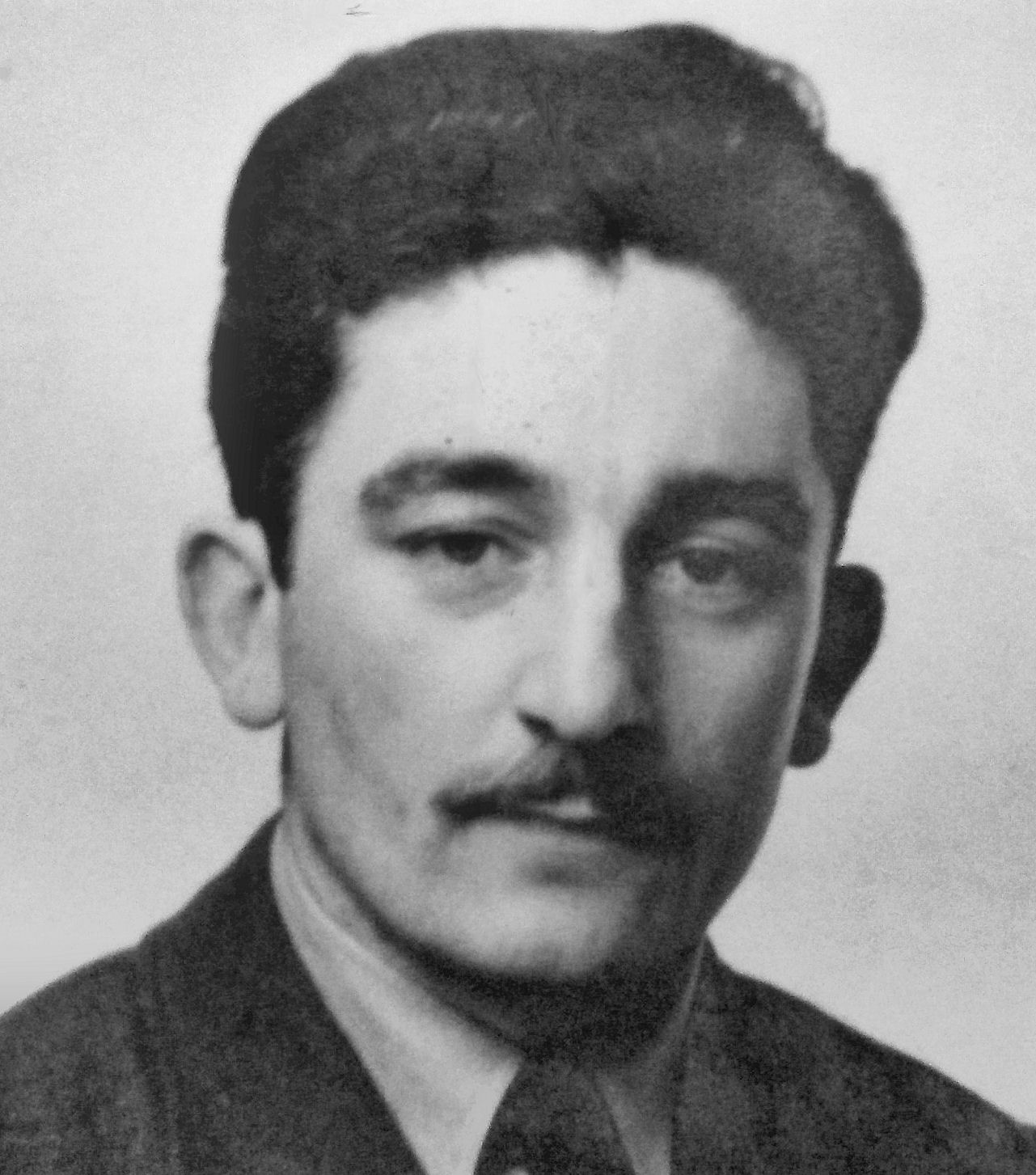 ATA
ATA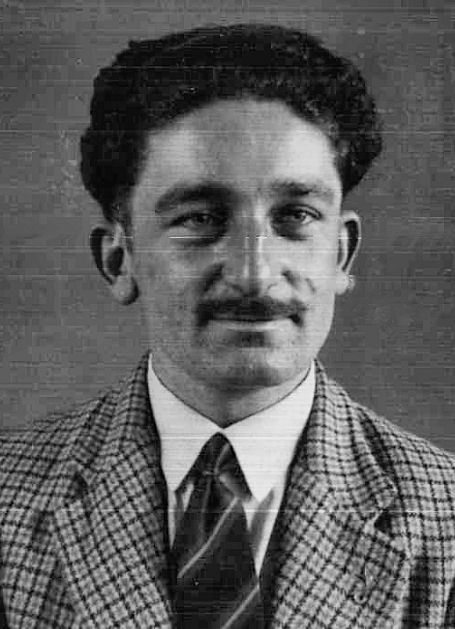 1946
1946prev. 3yrs 9months in RAF
A Dispenser
The RAF Selection Board in Harrogate reported that he "has good all round ability but is liable to lapses in concentration and is thus inclined to make mistakes."
d. 23 August 2012. The Pharmaceutical Journal reported his death: "Victor Cummergen, MRPharmS, aged 96, of 1 Widecombe Close, Bedford MK40 3DR. Mr Cummergen registered in 1948 and was formerly manager of various Boots stores in the North East, London Earl’s Court and Bedford."
-
Dale, John Douglas
-
Ducler des Rauches, J Phillippe
M.1065 * 3rd Officer
[Seconded from RAF]
J Phillippe Ducler des Rauches 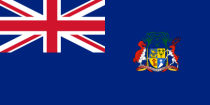
b. 26 Apr 1914, British Mauritius 26 May 1944 to 15 Apr 1945
Father: Philippe Ducler des Rauches
m. 12 Feb 1947 Marise Sauzier
F.C.C.S; Gen. Se. Mauritius Sugar Producers' Assoc.; Sec. Mauritius Ch. Of Com. And Mauritius Ch. Of Brokers 1946-53;
Mem. Maurtitius Labour Advisory Brd., Vice-Chair. Maurtitius Employers Federation
-
Gover, Thomas Edward
M.944 * 3rd Officer
[Seconded from RAF]
Thomas Edward Gover 
b. 6 Sep 1922, Taunton ? 14 Jul 1943 to 30 Apr 1945
d. 17 Mar 2010 ?
-
Haggas, James William
M.1108 * 3rd Officer [Seconded from RAF] James William Haggas 
b. 14 Dec 1916, Bakworth Yorks 30 Jun 1944 to 15 Apr 1945
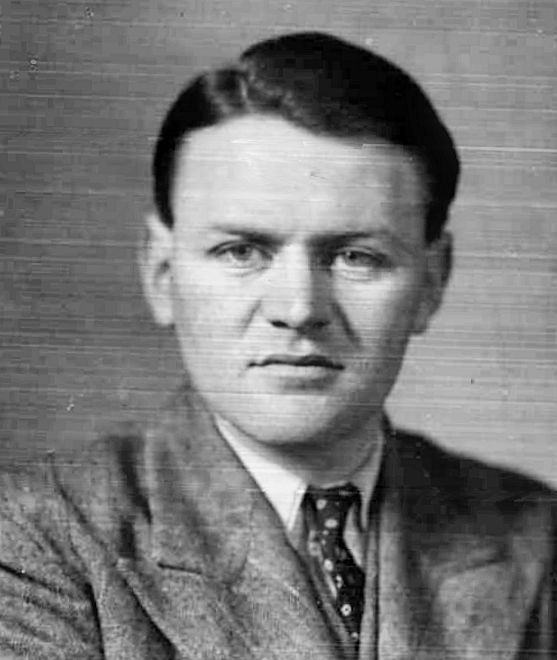 1949
1949An Engineer
Address in 1949: 1 Poplars Ave, Hatfield, Herts
-
Hawkey, John Walter
M.886 Pilot Officer
[Seconded from RAF]
John Walter Hawkey 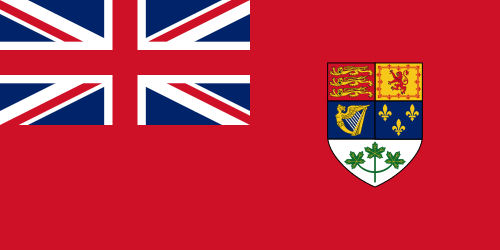
b. 2 Jun 1920, Parkhill, Ontario, Canada 19 Mar 1943 to 24 Jan 1944

ATA


Father: Joseph John Hawkey (d. 1921)
Next of kin: (mother) Mrs Beatrice Belknap [Hill] Dixon, Ailsa Craig, Ontario, Canada
prev. exp. 265 hrs on Harvard, Fleet, Master, Spitfire
prev. RCAF, RAF
Enlisted in Toronto in 1941, received his 'wings' 12 Jan 1942 from St Hubert, Quebec and was posted to England.
"Has had a lot of posting and little flying so browned off"
Postings: 5TFPP, 3FPP
5TFPP: "He is regularly ferrying Hurricanes, Masters and similar types. It will not be long before he is flying Spitfires. His general character is good... a well-disciplined NCO [he was a Flt-Sgt at the time]"
When with 3FPP, he stayed in accommodation at 5 Waltham Place, Cliveden Rd, Chester (Mrs B J Kelly)
30 Nov 1943: "This pilot requires hospital treatment and is unfit for flying. He will be admitted to Preston Military Hospital tomorrow."
He reported back on the 9 Dec 1943, but died a few weeks later in an accident:
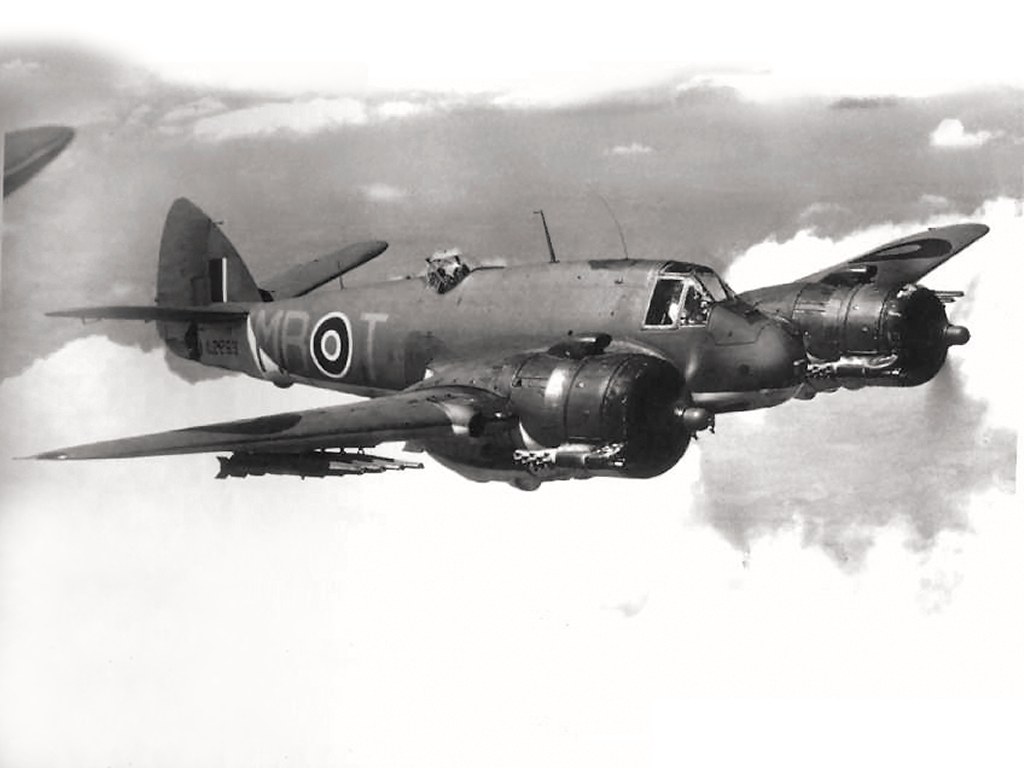
d. 24 Jan 1944 in Mostyn Hall Military Hospital nr Chester, following an accident the day before in Beaufighter X NE474, piloted by First Officer (RAF Sgt.) Eric Brunskill, which was hit by Mustang AG597 landing on the wrong runway at Hawarden. Pilot Officer E Vincent, RCAF, was also a passenger and suffered severe burns.
Buried Blacon, Chester, Sec. A. Grave 1073
After his death, his landlady Mrs Kelly went every week to put fresh flowers on the grave, and to keep it tidy.
Also commemorated on his mother's grave at Mars Hill Cemetery, McGillivray, Middlesex County, Ontario, Canada

"Beatrice (Hawkey) Dixon 1886-1975
P/O John W. Hawkey RCAF 1920-1944 Killed on Active Service at Cheshire, Eng."
-
Hill, Peter Brockwin
M.1155 * 3rd Officer
[Seconded from RAF]
Peter Brockwin Hill 
b. 20 Jun 1919, Hampstead, London NW 5 Sep 1944 to 15 Apr 1945
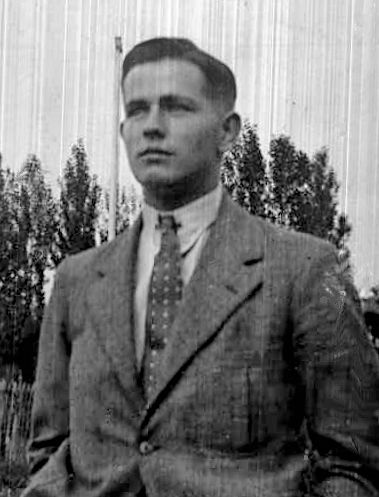 1938
1938prev. an aero engine fitter
Address in 1938: 'Crosby', 25 The Newlands, Wallington, Surrey
-
James, Alfred Francis Phillip
M.802 * 3rd Officer
[Seconded from RAF]
Alfred Francis Phillip James 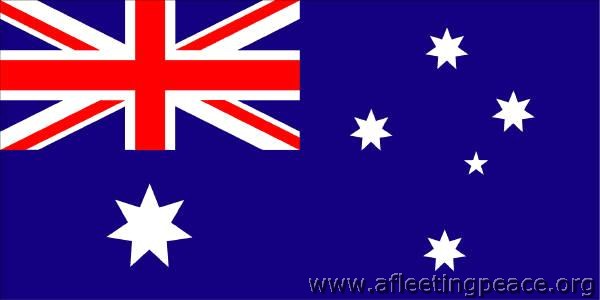
b. 21 Apr 1918, Queenstown, Tasmania c. 1 Dec 1942 to c. 15 Apr 1945
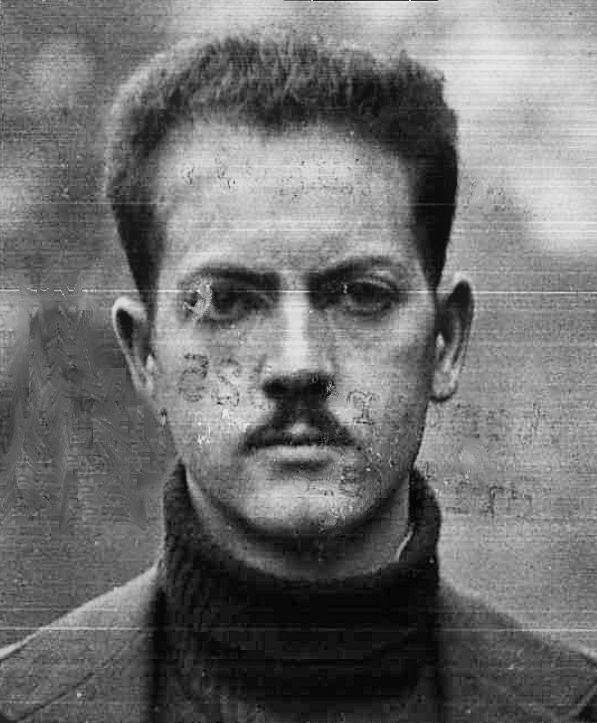 1945
1945 ATAM
ATAMAddress in 1945: Baliol College, Oxford
-
Jefferys, Charles Aidan Vernon
M. ---- Warrant Officer / First Officer
[Seconded from RAF, Ser. No. 968927]
Charles Aidan Vernon Jefferys 
b. 30 Aug 1910, Tetbury, Glos. 15 Dec 1942 to 10 Mar 1944
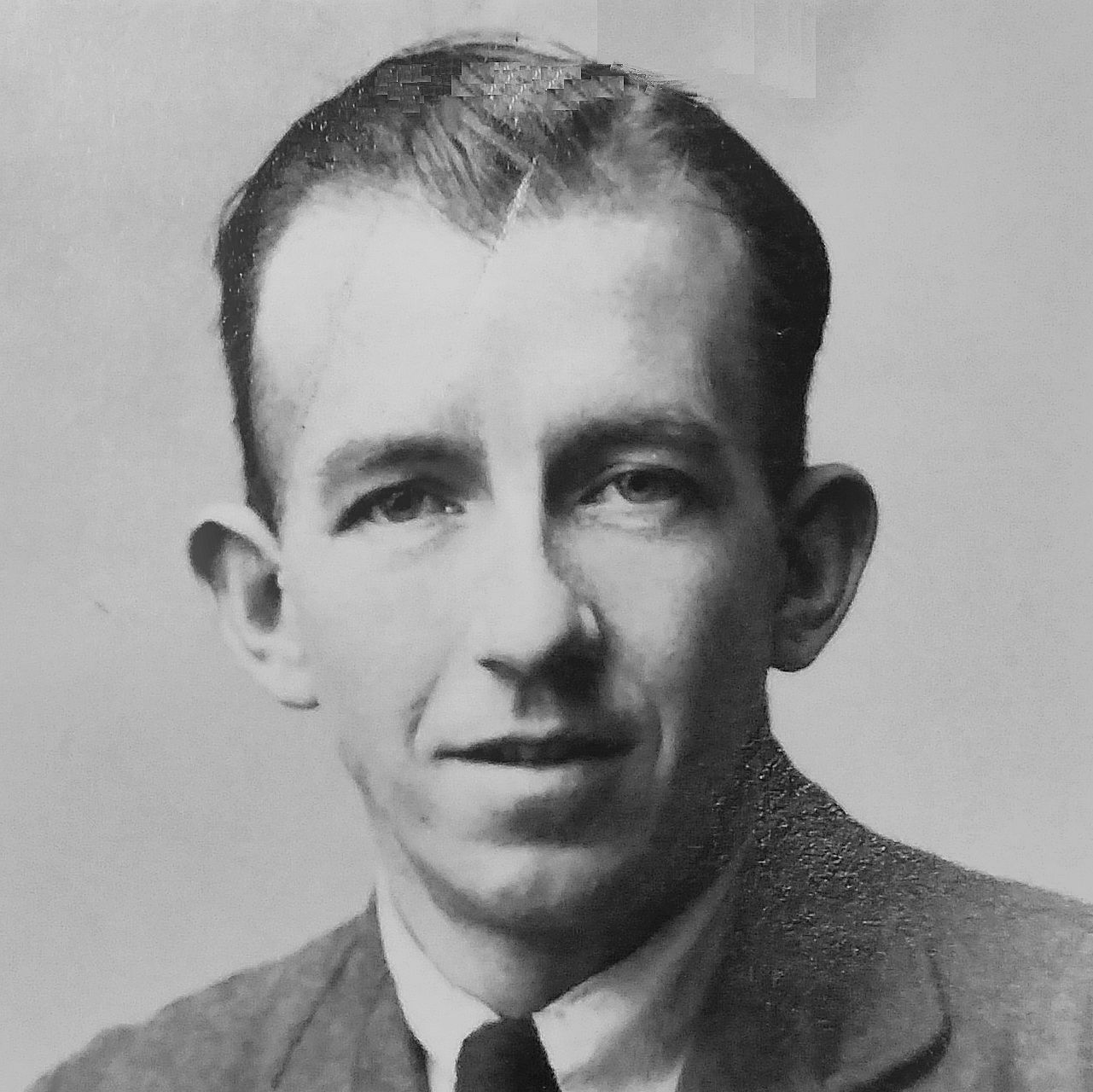 ATA
ATAEd. St Pauls School
m. Dec 1934 Mary Gertrude [Burton] in Stroud, Glos.
prev. an 'Engineering Representative'
prev. exp. 394 hrs plus 1.45 hrs night on Tiger Moth, Magister, Lysander, Oxford, Blenheim, and Wellington.
Address in 1942: The Woodlands, Malpas, Newport, Mon.
Seconded due to a) lack of night flying experience, and b) being of a 'highly nervous type'.
Postings: 16FPP
"A keen and sensible type of N.C.O. who should prove a useful ferry pilot. He was somewhat slow in emergency but he possesses good air-sense and is unlikely to come to grief."
" A very nice type whose flying is unfortunately not too good. He is under-confident and does not use his head but tries very hard."
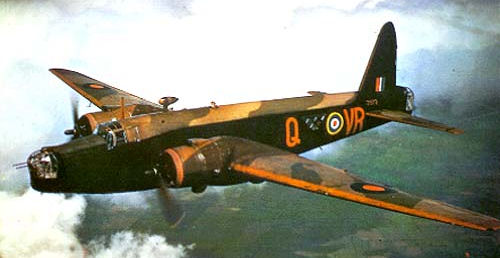
d. 10 Mar 1944 (Died in ATA Service) in Wellington II W5385 which after an excessive take-off run, rose slowly and then struck trees 1/4 mile N
NW of Aldergrove aerodrome en-route Vickers Armstrong Shawbury.Technical examination showed the elevator trimmers and trimmer control to be in the 'fully nose-down' position. "Evidence also showed that the pilot did not do the preliminary cockpit check in the normal fashion, since he took over the aircraft with engines running and did not run them up. The pilot appears to be to blame for this accident."
Buried Stroud.
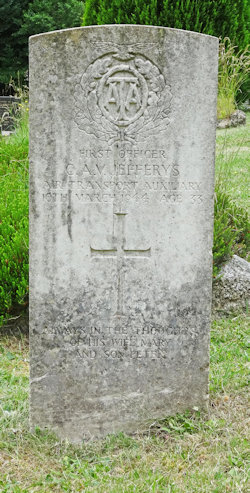 findagrave.com
findagrave.com"Always in the thoughts of wife Mary and son Peter."
In April 1944, Mary wrote to the Under-Secretary of state for Air, the Rt Hon Harold Balfour, to ask for his help: "As you know it was always understood that Peter should follow on at his father's school St. Paul's and he should be starting this coming winter as a boarder. Public Schools as you know are somewhat heavy on the pocket consequently it is imperative that I leave no stone unturned to improve my pension."
She reckoned that, due to Charles having being seconded from the RAF as an NCO, her pension would only amount about 2 guineas a week. He was unfortunately not eligible for the ATA death insurance payment of £2,000.
Peter did start at St Paul's, but by September 1945 Mary wrote again to say that she found her RAF pension "quite inadequate to cover his expenses and tuition."
Could the ATA, therefore please help them to emigrate to the USA? She wanted Peter to finish High School, and then Harvard "at my fiance's expense". Perhaps they could allow her 'free or reduced passage by way of practical appreciation of my husband's services and death?"
They said, well, no, or to put it another way: "It does seem that there is no justification and no argument that we could put forward in any way that will enable us to assist her in her request." Perhaps her fiance could stump up a bit extra?...
Anyway, Mary married Irvin B Miller in Sep 1946 in Newport, and sailed to New York in July 1947, stating that she was intending to stay in the USA.
-
Marsh, Francis Robert
M.801 Sgt / First Officer
[Seconded from RAF]
Francis Robert Marsh 
b. 17 Sep 1921, Bromley, Kent 1 Dec 1942 to 29 May 1944
Father: Francis Alexander Marsh, "Trading Business"; mother: Eliza Ann Grace [Lawrence]
m. 1942 in Bromley, Florence Elaine [Berryman]
prev. An Accountant; RAF from 21 Dec 1940 to 30 Nov 1942
prev. exp. 112 hrs on Tiger Moth, Harvard, Master, Spitfire in the UK and Canada
Address in 1944: 35 (later, 48) Roslin Way, Bromley, Kent
Postings: 3FPP, 7FPP
"Has not proved satisfactory at this Pool [3FPP]. He is slow in obeying orders and gives the impression that he feels that obedience to an order should not clash with his own convenience. As a pilot he is over confident and does not use his head."
"[7FPP] Discipline: Improved... should show more keeness in his job but otherwise handles his aircraft in what appears to be a safe manner... will not be ready for Class 4 until he loses his over-confidence"
2 Accidents:
- 18 Feb 1943, forced landing in Hart K6522 at Luton after he saw smoke coming from the engine (coolant leak)

d. 29 May 1944 - his Beaufighter NV195 disappeared on a ferry flight from Sherborne to Lossiemouth. A similar aircraft was seen (by two fishermen) to crash in the Firth of Forth at about that time, and then a fuel tank belonging to this aircraft was discovered on 30 May by a Mr. Martin Thorburn, a painter from North Berwick.
1 Jun 1944 - "Thank you for your letter received this afternoon. It was, as you say, very much of a shock for me. Somehow one expects these kinds of things with Bomber or Fighter Command but not so much with ferrying.
I suppose you have no idea how the accident occurred. Was it due to a fault in the aircraft or in the engine? Or was it the weather? He was usually very careful - more than ever lately as I am expecting a baby in September, Please give me any further information as soon as possible. Yours Sincerely, Florence E Marsh"
Their daughter Janet was duly born in September 1944.
Francis' body never being found, he was finally presumed deceased on 2 Feb 1945.
Commemorated on the Runnymede Memorial:

-
Marshallsay, Roger
M.1066 * 3rd Officer
[Seconded from RAF]
Roger Marshallsay 
b. Jul 1912, Poole, Dorset 26 May 1944 to 30 Apr 1945
m. 1939 Barbara M [Deyes]
-
Martin, Deryck John Michael
M.811 Flt-Sgt (RAF)
[Seconded from RAF, Serial No 1292918]
Deryck John Michael 'Mickey' Martin 
b. 21 Aug 1919, Bridport, Devon 15 Dec 1942 to 11 Oct 1943
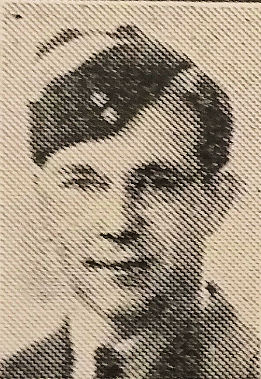
B.Sc. (Lon) at King's College, 1940
Address in 1942: 34 Marlow Rd, Maidenhead
prev. RAF 21 Oct 1940 - 15 Dec 1942
prev. exp. 127hrs in Tiger Moth, Harvard, Oxford, Wellington, in UK and S. Rhodesia
"Although the above-named member of the RAF is a clever and intelligent fellow, it is unfortunate that he suffers considerably from air-sickness. If he could overcome this difficulty, he should prove to be a very good ferry pilot."
Postings: 16FPP
17 Aug 1943, he was held to blame for a take-off accident in a Wellington.
"All through his training he has been exceptionally keen, well behaved and willing but his flying has been rather erratic and not as sensible as would be expected from his experience and intelligence."
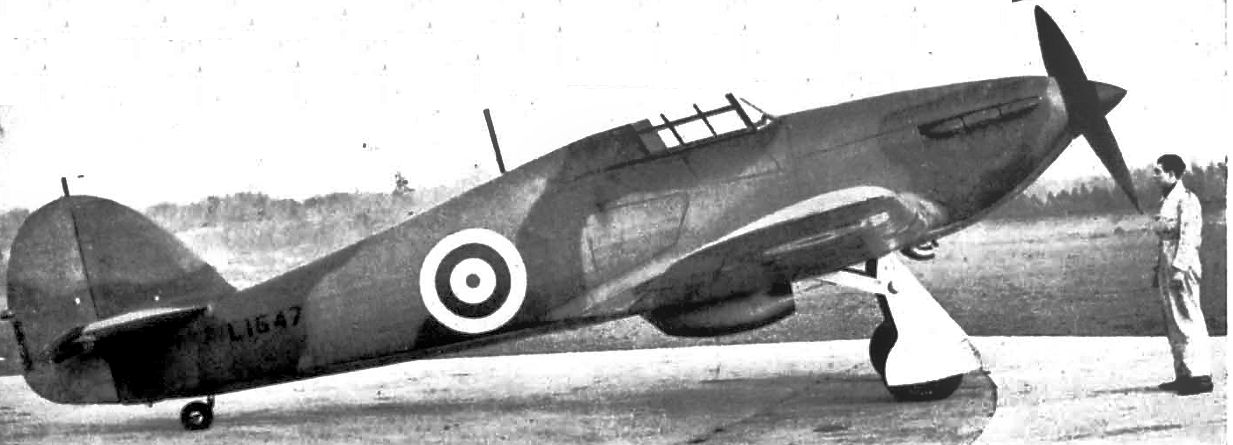
d. 11 Oct 1943 (Died in ATA Service) in Hurricane I L2026 which crashed at Cranage Farm, Kilmany, Fifeshire, after engine failure.
buried Baptitst Chapel, Marlow Rd, Maidenhead (where his father Arthur was the minister)
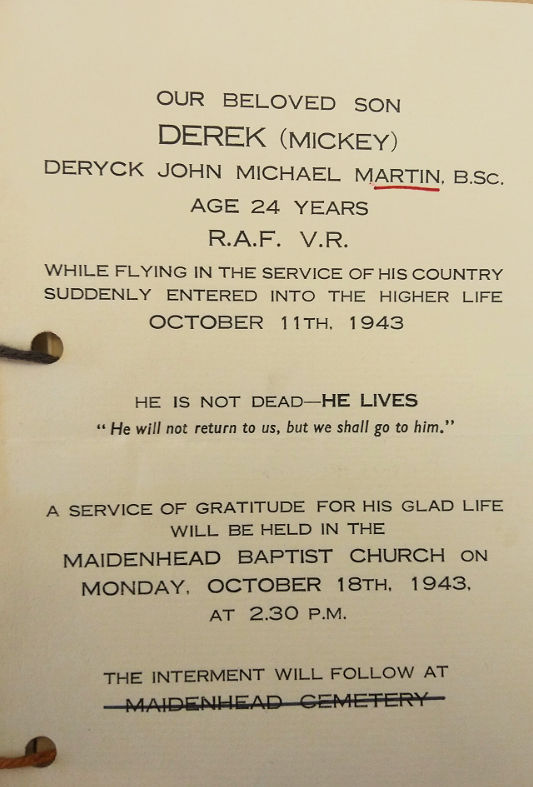
"He was a popular young man; he was a member of the Maidenhead Tennis Club and his wide circle of friends deeply mourn his loss."
-
Milliken, John Christopher
M.831 Flt-Sgt
[Seconded from RAF]
John Christopher Milliken 
b. 19 Sep 1922, Upton-upon-Severn, Worcestershire 6 Jan 1943 to 20 Aug 1943
Father: Mr Herbert Ernest Milliken (a farmer turned "broadcasting official"), mother Charlotte Jane [Goodbody]
prev. a farmer
prev. exp. 125 hrs in Stearman, Vultee, Harvard, Oxford, Wellington (some of this in Georgia and Alabama, USA - he trained at the Chicago School of Aviation in Albany, GA from August 1941)
RAF Sgt from 4 May 1941, based at RAF Shawbury and Lossiemouth; suspended due to 'inability to see & fly well at night"
Address in 1943: Bicknell Farm, Blagdon, nr Bristol
Postings: 5TFPP
"Has worked hard throughout [his Class 3 & 4 training] and although he started rather poorly has proved quite steady and should make a good type of ferry pilot. Average ability."

d. 20 August 1943 in Barracuda II BV759, which crashed in a field nr. Rufford Bombing Range, Mansfield, Notts after engine failure following a carburettor fault. Delivery from Blackburn Aircraft, Brough, to 15 MU (RAF Wroughton, Wilts)
 "1316791 Flight Sergeant J C Milliken. Pilot, Royal Air Force. Sometime of Bicknell Farm"
"1316791 Flight Sergeant J C Milliken. Pilot, Royal Air Force. Sometime of Bicknell Farm"Buried St Michael and Angels Churchyard, Butcombe, Somerset
-
Munro, Ian Macdonald
M.1106 3rd Officer
[Seconded from RAF]
Ian Macdonald Munro 
[Scottish, but] b. 3 Nov 1902, Birmingham 25 Jul 1944 to 15 Apr 1945
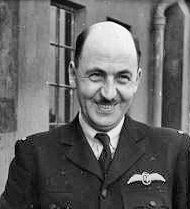 MAMM
MAMM
-
Selby, David Martin
M.872 2nd Officer
[Seconded from RAF]
David Martin Selby 
b. 7 Dec 1921, London 21 Feb 1943 to 18 Sep 1944
 ATA
ATAFather: Henry S Selby, mother Annie F [Sleat]
Ed. Alleyn's School, Dulwich, London
m. 1942 Dorothy [Winter] , one child
prev. Insurance Clerk; RAF Sgt Pilot
prev. exp 260 hrs on Tiger Moth, Oxford, Anson, Bisley (Blenheim Mk V)
Address in 1943: 59 Horniman Dr., Forest Hill, London SE23
6 Jul 1944: "This pilot's house was recently bombed and I granted him two days compassionate leave... He has found another house"
Address in 1944: 28 Netherby Rd, Honor Oak, SE23 (parents' home)
Postings: 5FTPP, 16FPP
"His Class I flying was very disappointing" but "He was given Class III conversion in view of his previous experience and did quite well"
"He has proved himself a reliable and steady pilot"

d. 18 Sep 1944 in Beaufighter X KW326 which crashed into the sea 1.5 miles from shore after the port engine caught fire on takeoff from Lossiemouth.
His body was recovered on the 21 Sep and buried in Camberwell New Cemetery, Honor Oak.

"His untimely end has been a great blow to his father and myself, as we loved him very dearly. Yours Faithfully, A F Selby"
"OFFERS IN WRITING - Velocette motor cycle, the property of the late S/O D M Selby. Age and mileage unknown, but probably 1932/34 model; at present at No. 16 Ferry Pool, Carlisle"
"Reference sale of motor cycle, I am prepared to offer the sum of £5 - F/O J Huxley, 16FPP"
His wife Dorothy m. 1948 George W H Painter
-
Shepherd, John
M.834 * 2nd Officer
(Flt Sgt, Seconded from RAF)
John Shepherd 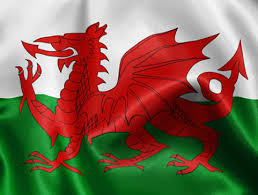
b. 13 Apr 1921, Cardiff 18 Jan 1943 to Nov-43
"This pilot came to ATA from the RAF with a little over 200 hours on light types. His Class 1 training was rather slow and although he showed about average ability his judgement and airmanship were not very consistent"

d. 3 Nov 1943 (Died in ATA Service) Beaufighter X NE203 hit the ground in a vertical dive, 6 mi W of Wrexham. The investigation concluded that "the pilot flew into cloud and lost control of his aircraft."
buried Cardiff Central Cemetery
-
Sisley, Norman
M.882 First Officer [Seconded from RAF] Norman Sisley 
b. 9 Oct 1920, Harlesden 7 Mar 1943 to 15 Apr 1945
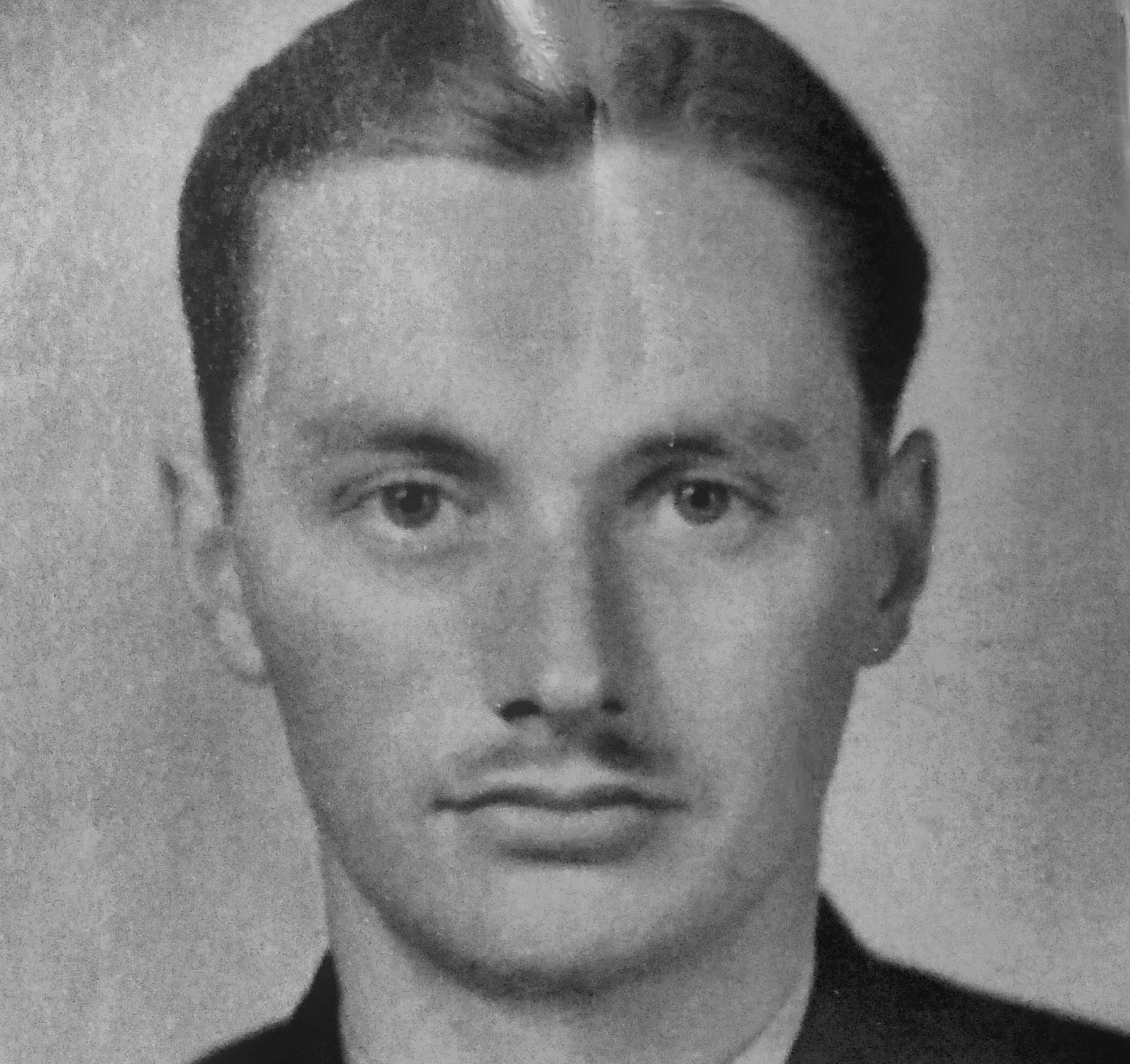
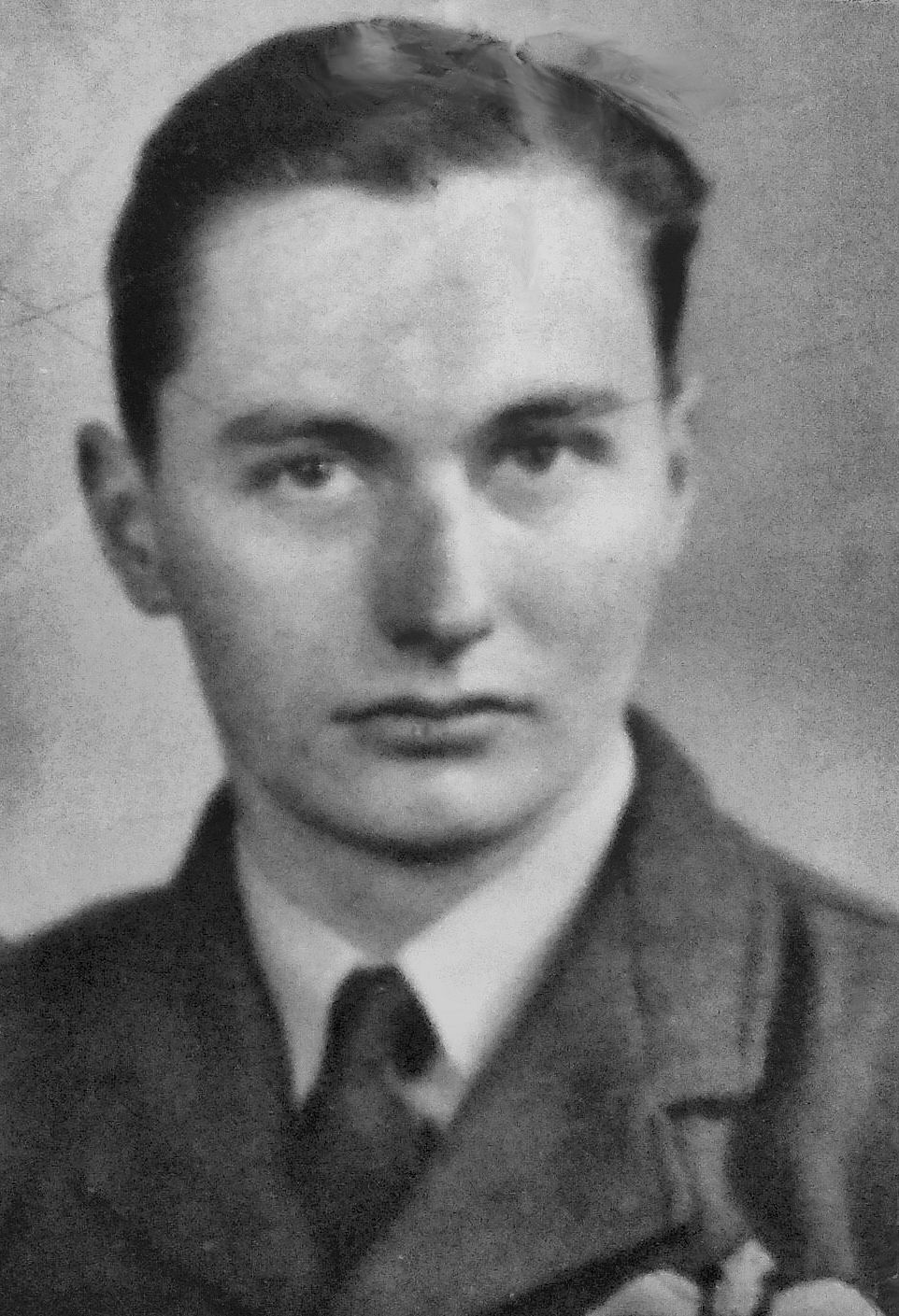
ATA
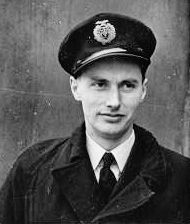 MAMM
MAMM
-
Thompson, Thomas Frank
M.841 First Officer
[Seconded from RAF]
Thomas Frank Thompson 
b. 31 Mar 1921, London 28 Jan 1943 to 27 Aug 1944
 ATA
ATA ATA
ATAFather: Thomas George Thompson, mother: Fanny Edith Rosetta [Galloway] of 54 Patmos Rd, London SW9
Ed. Reay Central Borough Polytechnic (National Certificate of Electrical Engineering)
prev. an electrical engineer; Sgt, RAF Lichfield from 14 Jan 1942
prev. exp. 140 hrs on Tiger Moth, Oxford, Wellington
Address in 1944: 521 Lordship Lane, E Dulwich, SE22
"Turned down night flying - scared" "Rather nervous"
Postings: 6FPP, 5TFPP, 14FPP
Reprimanded for negligence on 18 Nov 1943 when he taxied Hurricane Z4924 into a mooring block at Barton airfield and nosed over, damaging the propeller. His instructor said "I firmly believe that this pilot's trouble is due to a very poor retentive memory and inclined to carelessness and taking chances"
3 other accidents, one his fault
- 27 Oct 1943, forced landing in Anson N9536 after engine failure
- 30 Nov 1943 in Barracuda II LS486 which weather-cocked to starboard when landing, ran off the runway and the undercarriage collapsed.
On 21 Jun 1944 he was absent, having been on leave; when he returned he said this was due to "some trouble with a flying bomb which had damaged his house"
"A quiet and efficient pilot and a well disciplined NCO." "Navigation and map reading very good"

d. 17 Aug 1944 (age 24) in Oxford PH235.
Ferrying from Airspeed's factory in Portsmouth to 44 MU Edzell, Angus, Scotland; for an unknown reason (possibly hitting HT cables), the aircraft dived into the ground at about 17:30 near Holmes Chapel, Cheshire.
The two passengers, Third Officers John Douglas Dale (M.968) and Archibald Campbell Couser (M.967) were also killed.
"HOLMES CHAPEL 'PLANE CRASH
THREE KILLED
Three pilots of the Air Training Auxiliary (A T.A.) were killed when their 'plane crashed in a field off Knutsford-road. Holmes Chapel, last Thursday. They were Thomas Frank Thompson (23). chief pilot, of 31 Patmos-road. London ; John Douglas Dale (23). of 14. St. Mary's Crescent, Blackhill. Durham, and Archibald Campbell Couser (24), of 73, High Pleasance Falkirk. Their 'plane was seen flying low over the the village before diving suddenly to earth. The bodies were recovered from a wood thirty yards away.
At the inquest conducted by Mr R. A. Daniel on Monday Dr. A. D. Picton said he saw the machine flying level over the village at about 500 feet. Within a second or so it went into a fairly steep dive and crashed behind some trees. His impression was that the engines cut out and that the machine then dived. Before that he thought the engines were working normally.
Norman Forshaw, electrical engineer, Macclesfleld Road. Holmes Chapel. and Walter Caulfield, 30. Middlewich-road, Holmes Chapel. also gave evidence.
A Captain of the A.T.A. said it was a bad crash—too bad to ascertain any technical cause. The Coroner recorded a verdict of " Accidental death" in each case.
First Officer Moore. A.T.A., thanked the local police for their assistance. " - Winsford Chronicle - Saturday 26 August 1944
Buried Streatham Park Cemetery, London
-
Vergette, Edward Easton
M.970 3rd Officer
[Seconded from RAF]
Edward Easton Vergette 
b. 5 May 1921, Grimsby 21 Sep 1943 to 27 Oct 1944
 ATA
ATAEd. Royal Masonic School
He and his younger brother John were left the "residuary estate of Robert Spencer Vergette in trust" in 1929
m. Jan 1943 in W. Kirby, Cheshire, Ethel Marion [Griffiths]
prev. "Articled Pupil Auctioneer"; RAF Sgt Pilot from 24 Sep 1940 (Good Conduct Badge, w.e.f. 2 Oct 1943)
prev. exp on Master and Hurricane
Flying accident in Dec 1941 - he "was in Ely Hospital for three months"
Address in 1943: 'Clavis', Meols Drive, W. Kirby, Cheshire (parents-in-laws') then 'Derwent', Thame Rd, Haddenham
Postings: 5TFPP, 3FPP
"... quite satisfactory...provided he does not regard it all as 'all too easy' and tries continually to improve his flying and airmanship, he should make a good ferry pilot and officer"
Two accidents, one not his fault:
- 4 May 1944, forced landing in Hurricane II HV729 when a wrongly-installed petrol cock caused the fuel to be drawn from the reserve tank only
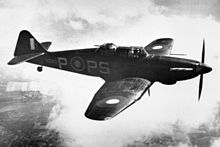
d. 27 Oct 1944 in Defiant T4019 which dived into the ground SW of Hawarden airfield on a ferry flight from Hullavington to Donibristle. Whilst circling the airfield prior to landing, the engine revolutions were observed to be fluctuating; the aircraft then stalled and crashed at Pear Tree Farm. A subsequent investigation of the badly damaged wreckage failed to reveal the cause.
Cremated at Landeican Crematorium, Birkenhead
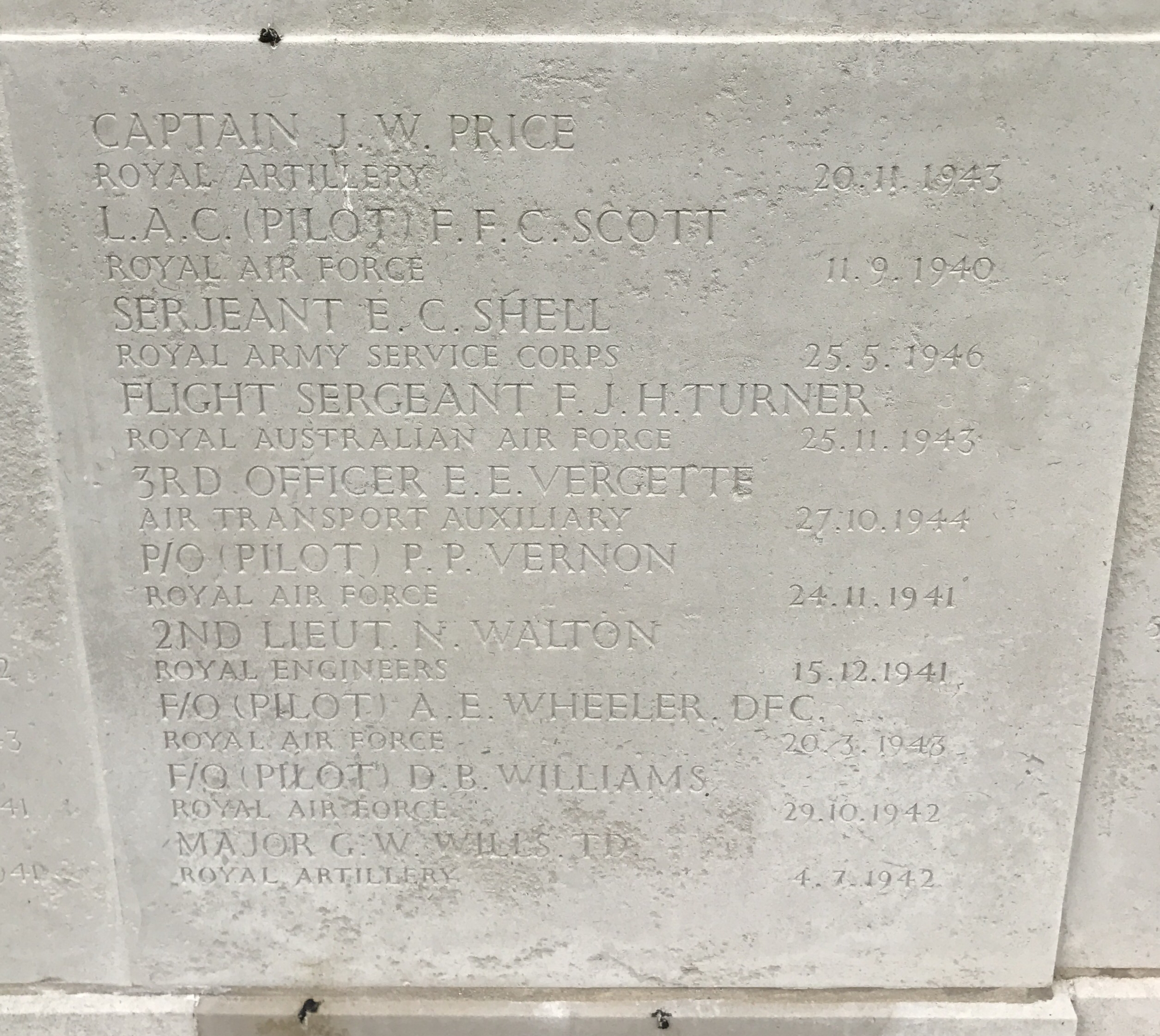 findagrave.com
findagrave.com"My daughter Marion wishes me to thank you for the offer of assistance should she need it immediately, & to tell you that she does not need this help. She much appreciates the expressions of sympathy conveyed in your letter on behalf of the ATA.
Yours Truly, Joan Heron Dodd"
"The death of my elder son... leaves me so broken. I felt he was not fit, and did my utmost to stop him returning to flight duties. What a spirit!... His only brother is out in Iraq and my late husband served right through the 1914-1918 war.
Yours Sincerely, Annie May Vergette"
Probate of £1,782 16s 11d was granted 20 Apr 1945 to "Joan Heron Dodd (wife of Henry Ayscough Dodd) and Joan Marjorie Griffiths spinster."
-
Watts, Reginald Edward
M.877 First Officer [Seconded from RAF] Reginald Edward Watts 
b. 8 Jan 1918, London 28 Feb 43 to 15 Apr 1945
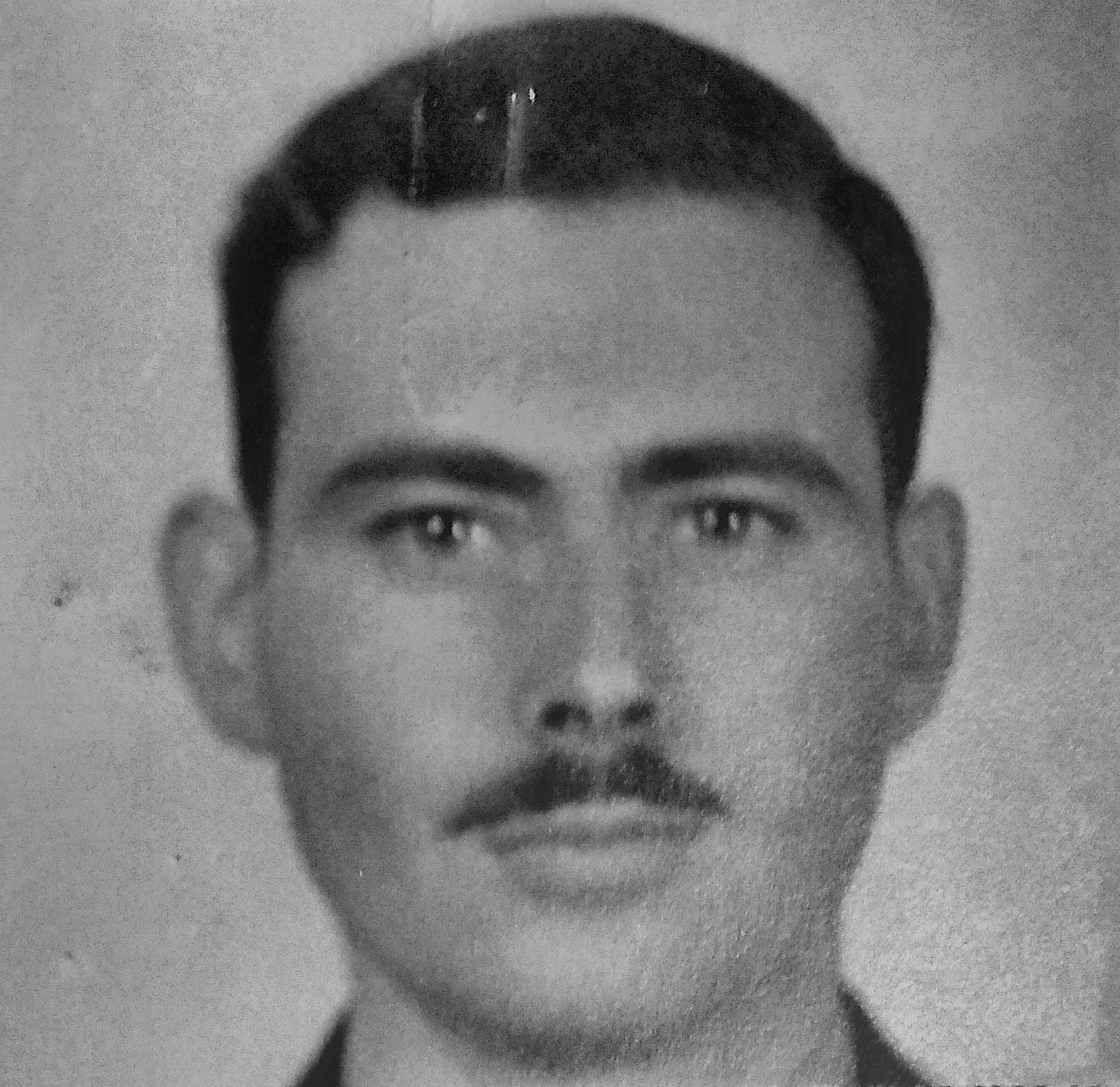 ATA
ATA MAMM
MAMMEd. Battersea Grammar School
Inter(mediate?) BSc Maths
prev. Aircraft Assistant Buyer
prev. exp 270hrs
m. 1941 in Hmmersmith Marguerite Victoria P [Parker, d. 2006]
Address in 1943: 3 Swindon House, Stanlake, London W12
Postings: 5TP, 2FPP
One accident, not his fault:
- 25 May 1944, when taxying his Spitfie, the airfield control van overtook him and then stopped in front of him. As he couldn't see over the nose, he collided with the van!
"An average pilot who is a keen worker and a likeable personality. Discipline good."
d. 26 Jan 1990 - Hook, Hampshire
-
Wrightson, Basil Frederick
M.941 3rd Officer
[Seconded from RAF]
Basil Frederick Wrightson 
b. 13 Feb 1922, Grimsby 16 Oct 1943 to 13 Feb 1945
 ATA
ATA
Basil's ATA Identity Tag - He was a Methodist, hence the 'METH'
Father: George Heath Wrightson (d. 28 Jul 1941). Mother: Laura [Tiede]
Ed. Barton on Humber Grammar School; St Johns College Yorks
prev. RAF Jan 1942 - Oct 1943
prev. exp. none [ab initio pilot cadet]
Address in 1943: 78 Blundell Ave, Cleethorpes, Lincs.
Postings: 5TFPP, 1FPP, 6FPP, 4FPP
"He has made very steady and regular progress and has proved to be a thoroughly reliable and likeable officer."

d. 13 Feb 1945 in Spitfire XVI TB329, which crashed in a field at high speed, at Opbrakel, Belgium on a ferry flight from 84 GSU, Lasham to Reception Flight B60, Belgium.
"The pilot appears to be to blame for the accident, having persisted too far in bad weather. The conditions at the time of the acident being 100yds visibility with cloud on the ground"
Buried Ronse [Renaix], Belgium

"Treasured Memories of a dear son and brother. A staunch and loyal friend"
His personal effects contained "a number of wireless parts, technical publications etc, some of which belong to S/O J E Ball, [John Edward Ball, a Canadian pilot, q.v.] with whom he shared a workshop for the purpose of constructing wireless sets."
"Dear Captain Mead,
My daughter and I are stunned by the tragic news regarding my son. He was such a fine lad and a good son & was loved by all who knew him."
"I hope you are right in your conviction that my son did not suffer in any way and I wish I could feel the same... The strain of it all is beginning to tell and I am going to have great difficulty to bear my loss.
Thank you very much for your kindness
Yours Sincerely
Laura Wrightson"
The ATA paid Laura £2,000 insurance on 30 Mar 1945.

 ATA
ATA